#the website i found the quote on does not seem to have this context also which is fun sjdkdkdldksm
Explore tagged Tumblr posts
Text
Starbomb and music theory 🦌🎵
CW : Strong Language
After 3 albums of greatness, it seemed like the magic of Starbomb would be a long gone memory, but miraculously in a tweet on the 27th of February 2023 our prayers had been answered ; the kings shall return.
And returned they have, with their new album Starbomb Boom: Rise of Lyrics. At the time I'm writing this post, their music video for Kiss the Elden Ring has recently been released and hopefully we'll still see new content for that 4th album.
If my username on most platforms is Starceptor it's because of Starbomb and Egoraptor (Arin Hanson), who's a member of the band alongside Danny Sexbang (Dan Avidan) and Ninja Brian (Brian Wecht) - listening to their songs on loop for years has significantly helped me become more casual with English (swears included), they introduced me to a whole new side of online and gaming nerd culture while also making me more interested in music-making in general by ensuring a place in my heart as one of my favorite bands of all time. By talking about them, I am somewhat also going back to the roots of my own motivations for making music, so I find it fitting that I refer to them in the context of my personal journey with composing.
I'm usually not a big fan of the kind of humor that Starbomb embraces but, they use it in such an over the top and self-parodic manner in their songs that it loops back to being funny again. As a celebration of their new album I wanted to go back to this awesome band in order to analyze what constitutes their musical identity.
Unfortunately, they already beat me to it :
youtube
This is usually the part where I sing the chorus out. But we haven't established what this song is all about. Then I chime in real quick for a just a second as the character delivers a line that reminds us of the joke. And I'll respond with harmonies, isn't that dope ?
This is when the song concept should heighten for effect. If you think we use that formula a lot, you are correct.
Danny said everything there, Starbomb does rely a lot on very similar patterns from one song to another. They are a self-described (in the about section of their website) synthpop/hip-hop band, and these pop influences can definitely be found all throughout this "formula" they "use a lot". Since the late 1970s, synthpop focused mainly on minor key songs, and if we take a look at the first Starbomb album :
I choose you to die / C-Minor
It's dangerous to go alone / A-Minor
Mega-Marital problems / D-Minor
Rap Battle : Ryu vs Ken / F#-Minor
Book of Nook / A#-Minor
Regretroid (my personal favorite) / Bb-Minor
Kirby's adventure in Reamland / G-Minor
The Simple Plot of Final Fantasy VII / A-Minor
8 songs in minor key, but the repetitions do not end here. Without going into much detail, most of the progressions within the first album are very common, almost cliché in pop music and well, there are some other redundant patterns...
To poetically quote this review of the first album ;
"[...] the phrase “What up b*tch?” is used so many times on this album, you begin to wonder whether Jessie Pinkman had a hand in its creation."
Point is, the instrumental at first never was the focus of Starbomb songs, the lyrics and their punchline were. But once you fall for the charm of these dumb jokes that get overextended to the full lenght of a song, you begin to love these same synthetizers you hear almost every time or even appreciate in what ways the instrumental might differ from the usual (shoutout to the chilled out groove of It's dangerous to go alone). The band is very aware of this, in fact, while all of their songs in the 3rd album sound quite unique, the one that ressembles the most the formula of their earlier songs is precisely the parody of their own repetitions : This song sucks. And from the first to their fourth album you see their progression wihen it comes to making the back-up music for their songs thematically coherent (starting at first with songs like Luigi's Ballad that alternate to a different tempo whether Luigi or Mario are singing, to reallly taking full effect with the second album onwards. For example how can't I mention one of their most recent songs Nintendo's Greatest Announcement done entirely in whispered rapping as said "Announcement" supposedly is a secret leak).

Arin is hitting that yoinky spoinkly like a champ.
If it weren't for Starbomb, well first of all I wouldn't have named myself Starceptor and therefore later on Stiaral, but I probably wouldn't have been introduced either to an awesome passion project on the internet that would have influenced me to work on my own stuff using also back-up synths and some chiptune soundfonts I'd end up playing around with on MuseScore.... Oh and fun thing the base for my fursona's hairstyle actually is Starbomb Link's cut.

Best Link design ever /hj - love what they did especially with the eye lashes.
#Youtube#starbomb#egoraptor#danny sexbang#ninja brian#music theory#musescore#synthpop#hip hop#nerdcore#music
3 notes
·
View notes
Text
This might seem like a nitpick, but I actually think it's fairly important and exemplifies the way misinformation can spread so easily.
To anyone who reblogged the original post, did you read the article linked in it? Or did you just assume that it was a reliable source and reblogged it?
Because I read the article and I didn't get past the 7th paragraph because Anna Louie Sussman doesn't know how to cite her damn sources which is a red fucking flag.

See this bit, where Sussman quotes a 2016 survey by the Ministry of Gender Equality and Family (MOGEF), and states that it found the incidence of intimate-partner violence (IPV) to be 41.5% in Korea. Sussman then compares it to the global average of 30%. This tripped me up because this article is from 2023.
The rate of IPV in Korea given is 6-years-old; it is outdated. Especially so considering Sussman states in the article that the 4B movement began somewhere around 2015/16.
Other problems with it include the fact that it's not entirely clear whether the 41.5% is the overall rate or just the incidence rate for Korean women. Further, Sussman just doesn't cite any source for the global average of 30%?
[This is what she's sourcing by the way, it wasn't too difficult to find]
All this considered, I decided to just quickly have a look at the survey itself. Sussman provides a link to it. To the 2016 Domestic Violence Survey (DVS) conducted by the MOGEF that Sussman is quoting from.
This is the link.

If you look very closely, you might notice that this isn't the 2016 DVS.
This is a Doctoral Dissertation by Soojeong Kim.
This is not how you cite sources.
But okay, as long as Kim cites the survey, it's fine. I can just CTRL F and look for 41.5% to make sure this dissertation cites the survey. Then I can go down to the references and find the actual survey and CTRL C CTRL V into Google Scholar to check.

Kim appears to quote the survey and quotes the exact same figure.
I'm still not entirely sure if said figure is the overall rate or just for women, but I'm leaning towards the latter.
Anyway, the survey isn't in the references. Kim is not actually citing the survey. She's citing (Kim, 2016).

It's a bit like a game of Pass the Parcel where the wrapping paper has been swapped out for sandpaper.
At least that's what it felt last night when I realised that the paper Sussman cites for a different paper is a tertiary source, at best. I repeat,
This is not how you cite sources.
Especially not when you are citing two different papers that fall under (Kim, 2016).

I read the entire dissertation last night; it did not enlighten me as to which paper cites the fucking survey. In a doctoral dissertation, no less.
Neither papers came up in Google Scholar so I just went to bed.
I came back this morning to 1) try to actually find the survey that Sussman quotes and 2) finish reading the article.
And I think I've figured out as to why Sussman didn't just link the survey because I cannot find the survey. The website for MOGEF will only load a broken version of the homepage for me which doesn't help. Best I can find is a study by Young-Ran Han and Hye Young Choi where they conducted a secondary analysis on the data from the 2016 DVS.
This doesn't excuse Sussman's awful citing though. Again, at best, she linked to a tertiary source to back up her claim, meanwhile not citing a source for another stat, which is something she repeats as the article goes on. She also notes that she spoke to several Korean academics so she has quite the large well from which to obtain sources.
Further, the study by Young-Ran Han and Hye Young Choi casts a bit of a red flag over the article itself.

Han and Choi's study doesn't link to the original survey, but it does give us more context as to where the 41.5% figure came from.
The 2016 DVS only surveyed 6000 citizens which certainly isn't a small sample, but the population of South Korea is nearly 52 million, meaning they surveyed about 0.0001% of the population if I have my maths right;
The sample was comprised of 4000 women and 2000 men which makes comparison across gender lines a little flimsy. The data for the men is a lot more likely to be skewed;
The sample was limited to one person per household which is going to skew the data;
As will the fact that it's a self-report questionnaire you have to complete in your home;
I didn't take a screenshot of it because it would be just gigantic block of text but the survey appears to have been entirely quantitative, using likert scales.
This mythical survey that I can't find is not going to have accurate statistics that you can quote.The design of that survey is fucking terrible.
Also, the 41.5% figure does not appear in Han and Choi's study anywhere. They don't quote it so I have no idea if it does appear in the survey that Sussman is quoting from.
This criticism is not a nitpick.
I fell down this nightmare of a rabbit hole because I wanted to quickly verify that a statistic a journalist quoted was what it was purporting to be. If I cannot trust a journalist to cite their source properly when quoting a statistic, how the fuck am I meant to trust the rest of their article?
And I cannot be the only person who read the goddamn article. Did no one else pick up on the gigantic red flag that is a journalist citing data from one paper but linking a different paper as the source? Even if you didn't go down the rabbit hole like I did, that first step is a red flag.
I don't want to condescend, but oh my fucking god, you cannot take everything at face value. People lie; people deceive; people omit details; people change the narrative.
Not only is this how misinformation spreads, but it's also a tactic that TERFs use all the time to convert people.
Please stop playing right into their hands.
me when i dont know anything about feminism in rok
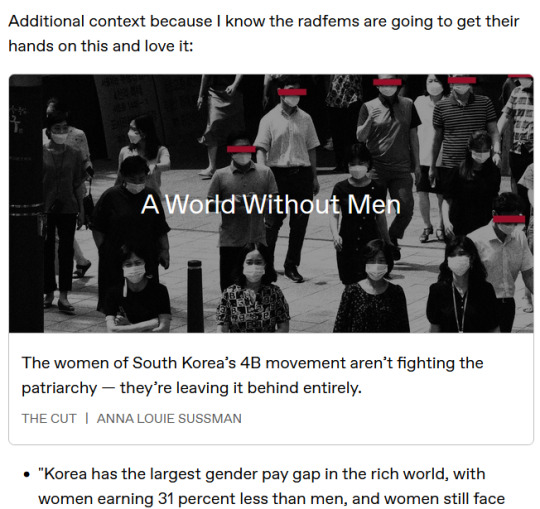
6K notes
·
View notes
Text
Another Vent:
By the way, apparently "Crows Critique" blocked me because-
And I quote-
"They actually lied about thier age!"
When if they looked at my blog just ONCE.
Tried to look at the receipts on my blog just ONCE.
Or actually tried to communicate on the issue.
They would know that I never did that, and the "12" thing happened because of a goddamn disability. One, with things that I legit cannot control since they happen where I cannot see it, no matter what settings that I use it still happens to me.
But did they want to listen? Noooooooo because "I HATE VIVZIEPOP!" or "ITS WRONG WHEN VIV DOES IT!" is all that seems to matter to these kinds of people.
Also, apparently that Cherry and several other fully grown adults stalked and harassed me since I was a child, and went after other innocent people "for their safety." BULLSHIT!
What about that EX Spindlehorse worker's safety, the person who (rightfully) called them an asshole for LEAKING THIER POST ON TWITTER!
What about my other freind, who SPECFICIALLY told them not to leak it onto a public (where millions can see!) website, but they did it anyway because of- you guessed it- a petty hate boner for my old blog because of how much they hated my takes on a cartoon.
Does thier safety matter to you? No?
Then why are you guilt tripping people into thinking that it's ok to harass minors and people with serious mental illnesses (such as the person who told them not to leak it for THIER safety) and using thier emotions and lack of knowledge on the issue against them?
Oh yeah, because you're a manipulator who is only doing this shit out of boredom. Not for your "safety", but out of spite towards something that happened a whole year ago to the point where you obsessively stalked our server till you found the "right" dirt to leak online.
What a disgusting way to spend the rest of your life, harassing others and bragging out it proudfully as if you just "achieved" something, when really, all you "achieved" was wasting your life and causing innocent people to suffer.
You're so mad about people treating Vivziepop like a teenager?
Stop doing with everyone else that you know.
You're so mad about Vivziepop taking shit out of context or using her friends to attack innocent people.
Stop doing it with everyone else that you know.
Be a honest and consistent person, and problems such as that wouldnt happen... in the first place!
As funny as much of this is, in all seriousness, much of this kind of behavior has caused serious harm to the fandom.
It needs to stop, and as much as I wish that I could do something about it, but I cant do everything about everyone, so they're on thier own at this point. All I can do is what im capable of, help those that I can help, be with those I can trust, and just... live my life.
But that's it, after three years I am officially done with this fandom's bullshit. If anything else happens, i'll just block and report.
I have things to write, and just important things to me in general and im not going to waste the time that I need for said things on interact with these 🤡 or talking about this more than an hour or so.
IM DONE.
Goodnight! 👍🏿
#tw fandom drama#and if anyone mentions this shit to me ONE MORE TIME#I am either muting#or in more extreme cases#blocking#thats it#I have a life and I am NOT wasting it on those who dont help me grow my wellbeing or my happiness.#im-#DONE!#goodnight everybody!#🎵
9 notes
·
View notes
Note
Can I ask what's wrong with Michael W Ford's books? I never read them but I've seen often people recommending them, so I'm curious. Thank you and have a nice day.
Thanks for the question! Sorry if this gets a little long, TL;DR is at the bottom but I've broken down some more specific examples in point form.
I'll preface this by saying that if people get something worthwhile from Michael W Ford's books, that's their business and I'm happy for them. However, there's a few things about his writing and him as a person that I don't really love and struggle to get behind. Most of the specific textual examples I give are from the Bible of the Adversary specifically, as it's one of his more famous books and the only one I personally have had the mental fortitude to page through so far.
- I'm immediately leery of anyone who's often described as a "visionary" or "luminary" on websites selling or listing their books, especially when I've gotten the feeling that it's just that his books are accessible and plentiful. Even among fans of authors like E. A. "Become A Living God" Koetting, the general opinion seems to be that his books lack a lot of consistency and are a bit poorly written. Can confirm for the Bible of the Adversary, at least. There's some parts of that thing that could have used a once-over by an editor.
- I try very hard not to use what happened to the Greater Church of Lucifer/GCoL against him. Another member of the community that I do still (loosely, infrequently) interact with was also involved, and while I sincerely wish they'd both more deeply researched the man they were signing up to run a very public and scrutinized church with, I think his turning into a scam artist who publicly converted to Christianity was enough punishment there. Likewise, I'm a bit uncomfortable with his past involvement with the Order of Nine Angels/ONA/O9A given the fact that they're a pack of murder advocating nazis, but apparently he left when he discovered that fact, so I try to give him the benefit of the doubt that he truly did distance himself from them immediately upon learning of their beliefs, as I don't know when these things became more widely known. However, both of these fumbles alongside how he presents himself and his books just don't sit well with me, as the most generous interpretation is that he was twice-misled in some pretty dangerous and harmful ways by those that are damaging to the public perception of Luciferianism, but still likes to be some figurehead of the Luciferian community. People make mistakes, and people can be misled, and people can learn from past experiences, but his track record is a bit upsetting for a supposed authority.
- His work includes pieces and ideas from occultists or practices that I tend to avoid in my own practice and study, such as Thelema and Crowley's writing as a whole, inspiration taken from the Temple of Set/Setian magic, Qlipoth (because it wouldn't be a Luciferian grimoire without pilfered Jewish mysticism), and forms of Gnosticism that embrace the idea of God as an evil demiurge (which i explained my discomfort with in my previous post). I'm also not a huge fan of his "all magic comes from within" approach (and find it hard to reconcile with his frequent use of Luciferian deities/spirits and demons), nor that he'll talk about Cain's role in "Luciferian grimoires" without actually naming any... though given how similar a piece of Lilith themed artwork he's done looks to Andrew Chumbley's illustration, I assume he means the sort of books the Cultus Sabbati was writing. I wish I still had the Ford version saved or could remember which of his books it's from, the side by side comparison is painful but without it I risk looking like I'm making things up.
- Heavy, heavy use of Lilith, which I don't love for reasons I outlined before. She mostly seems to appear whenever spooky lustful sex magick is being discussed, which is great, that's great.
- He also uses the Wiccan wheel of the year sprinkled in among his more Luciferian focused holy days, which is just really funny to me. Why are we celebrating Beltane, Michael? Why are we celebrating Imbolg? (Page 69)
- He likes to use a lot of "black magic" and "vampyre magic" stuff which tends to feel very sensationalized and over the top to me. I've seen discussions of vampiric magic I found very interesting, but so far his hasn't been one of them.
- He sometimes seems to conflate Lucifer with Samael which I really truly dislike, though it's admittedly not the most baffling or out of left field take I've seen.
- Ford at times seems to either willfully misrepresent or misunderstand information he's passing along. For example, in the Bible of the Adversary he says that Cain's name comes from "...root ‘Kanah’ which means to possess. This by itself presents the antinomian nature of his essence, while instead of sacrificing his most bountiful items to the Lord, he kept them for himself." As I understand it, discussion surrounding Cain's name possibly coming from the Hebrew word קנה (kana) lean more into it being the word for to get or to obtain, referencing Eve's declaration after his conception that she'd gotten a man from the Lord. I'm all for alternate interpretations, but it feels like needless edgy-fying to fit the narrative he's trying to present. (Quote from Page 58)
- He'll say some absolutely bonkers shit like "Abel in some Luciferian Lore is considered a lower pre-form of Cain, thus the sacrifice was not literal" with zero citations or references. Like sir what the fuck does that mean, what Lore, please give us the lore please. (Footnote, Page 59)
- His interpretation of the Watchers and the Book of Enoch is so insultingly bad that I won't even relay it here, but if I see one more person claim that an angel, demon, or spirit they want to distance from Christianity or Judaism is actually a Babylonian god I'm going to go feral.
- As I've hinted at above, it feels like he'll just cherry pick and regurgitate for no real purpose. A few spirits from other texts like the Lesser Key and the Grimoire Verum get mentioned for... mostly the set of names, it seems like, he just kind of lists them out of context.
TL;DR, Michael W Ford feels (to me at least) like someone who has picked out the more appealing and edgy occult trivia and magic he could find from a wide range of sources, recontextualized the parts that didn't appeal to him until they fit his aesthetic and purposes, and presented them as a workable entry point to the Luciferian religion and its potential magical systems that is all flash no substance... and then could barely polish the flash. I don't like that he's many people's first exposure to the concept of theistic Luciferianism, and I don't like how authoritatively he presents his jumbled works as what the religion is truly about when it's so broad a label. Again, if there is something that someone finds useful within his books I am very happy for them, but I have struggled to find anything I could point to that make them worth the read... even for me to investigate further keep critiquing.
I honestly do not know why so people recommend them, unless it's just that they're easy to buy, reasonably inexpensive, and specifically have the Luciferian label on them. If that's truly the case, those people are being lazy and uncritical in a way that doesn't speak well to their apparent Luciferian ideals.
47 notes
·
View notes
Text
daniil dankovsky is autistic and here’s why:
because i’m autistic and i said so
i kid, obviously. what sort of autistic person would i be if i wasn’t read to back up my silly little claim with an overly long post of evidence a total of three people will read? (hi ned hi jordan hi raven :))
i’m aware that this is cringey because adults aren’t supposed to have autism or interests or talk about either of those things, but this is my blog and you are free to block me if the cringe is too much for you.
these are some things i picked out from the DSMV’s diagnostic criteria, found on the CDC website:
deficits in social-emotional reciprocity
reduced sharing of interests, emotions, or affect
abnormal social approach
abnormalities in eye contact and body language
defecits in […] understand[ing] relationships
difficults adjusting behavior to suit various social contexts
repetitive motor movements or speech
rigid thinking patterns
highly restricted, fixated interests that are abnormal in intensity or focus
hyper- or hyporeactivity to sensory input
there’s also some misc. stuff not in the diagnostic criteria (though it may be in the adir or gars-3) i thought was worth noting.
important note from the diagnostic criteria: “symptoms cause clinically significant impairment in social, occupational, or other important areas of current functioning”. i’d say that in his case, they do.
spoilers for pathologic classic, pathologic 2, and the marble nest
deficits in social-emotional reciprocity
in bachelor route of classic, daniil
seems completely oblivious to eva making advances toward him, to the point where she complains to him that he’s ignoring her in favor of asking questions about simon.
seems surprised when people mention maria being in love with him, despite outright asking her a couple of times if she’s flirting with him.
not to mention the fact that he asks her that at all.
his inability or resistence to making connections with others is typically considered one of his character flaws. although it is not outright stated in the dsmv criteria, one trait of autism and other neurodivergencies is “having extremely high or extremely low empathy” - and daniil, despite being a doctor, lacks empathy. which is not to say he doesn’t care at all. i think that he does, but is terrible at showing it.
for example, this scene from marble nest:
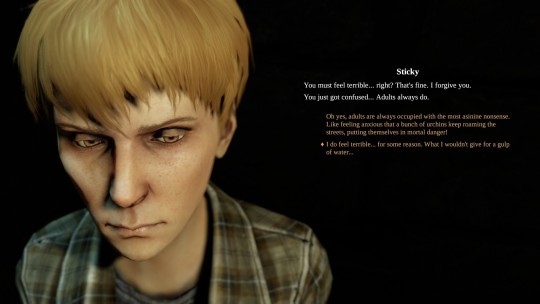
Sticky: You must feel terrible… right? That’s fine. I forgive you. You just got confused… Adults always do. Daniil: Oh yes, adults are always occupied with the most asinine nonsense. Like feeling anxious that a bunch of urchins keep roaming the streets, putting themselves in mortal danger!
daniil clearly cares about sticky’s wellbeing (and the wellbeing of the kids looking after him, though he’s not cognizant that he’s in a coma), but his way of showing it is… kind of by being a jerk. all of which bleeds into the next item on the list
reduced sharing of interests, emotions, or affect
he has no problem sharing his interests, but in both pathologic classic & pathologic 2, daniil speaks with a flat affect - which is to say that he lacks intonation. the words we read him saying may be dramatic or come across as passionate, but the actual voice reading his lines is very monotone, which may contribute to being read as lacking emotion.
and in pathologic 2, he has a voiceline lamenting not telling “her” (eva?) how he felt
in marble nest, he’s teased by the tragedians for being “heartless”:
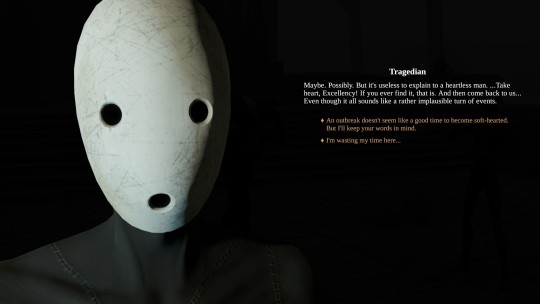
Tragedian: Maybe. Possibly. But it’s useless to explain to a heartless man. …Take heart, Excellency! If you ever find it, that is. And then come back to us… Even though it all sounds like a rather implausible turn of events.
abnormal social approach
daniil has a tendency to say things that are tactless, odd, or just socially inappropriate. i probably don’t need to point out too many examples, as i think it’s fairly obvious - these are the things people love to pick at when it comes to him, but i do have a few in mind. like, for example, from haruspex route in classic:
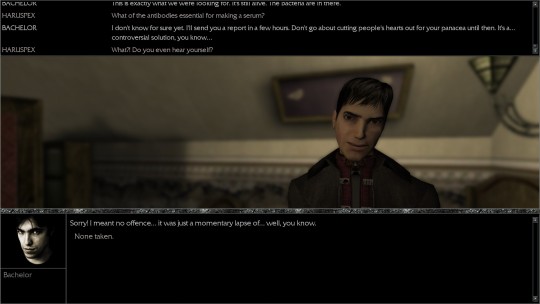
Haruspex: What of the antibodies essential for making a serum? Bachelor: I don’t know for sure yet, I’ll send you a report in a few hours. Don’t go about cutting people’s hearts out for your panacea until then. It’s a… controversial solution, you know… Haruspex: What?! Do you even hear yourself? Bachelor: Sorry! I meant no offence… it was just a momentary lapse of… well, you know. Haruspex: None taken.
until artemy points out, daniil doesn’t seem to be aware he just said something rude. even with therapy, picking up on social cues doesn’t come naturally to people with autism, so we tend to say things that come across as rude or strange to others without realizing we’ve put them off. we tend to lack a “filter” that tells us when things are or are not appropriate to say. even when we may recognize it, the rules may not make any sense to us. for example, it makes very little sense that allistics favor politeness over honesty.
i think the glaringly obvious abnormal social approach in pathologic 2 is him threatening to hold artemy at gunpoint to get in the house, which is just overkill, but my personal favorite comes on day 7, when he’s complaining about the orders aglaya has given him. artemy stops him to say he doesn’t understand what daniil wants from him, to which daniil replies:
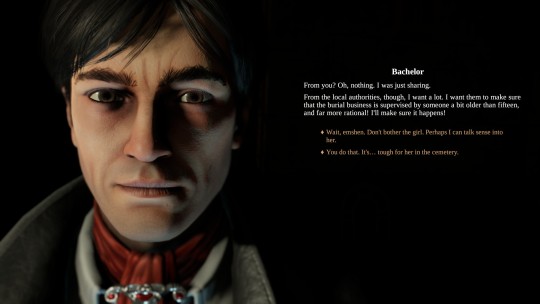
From you? Oh, nothing. I was just sharing.
to daniil, they were just having a normal conversation. but some part of this - his tone or his words or maybe even his body language - didn’t give artemy the impression that this was supposed to be a regular conversation. (we could, in fact, attribute the same idea to artemy here; why didn’t artemy pick up that this was a normal conversation? the reason i count it towards daniil is because artemy doesn’t seem to have this problem with anybody else. for the record: i don’t think artemy is neurotypical either.)
abnormalities in eye contact and body language
it’s hard to get proof of this in video games, but i will say i think it’s very funny that in pathologic 2 daniil’s idle animations are “pacing”, “sitting like he desperately wants to start bouncing his knees but is stopping himself from doing it”, and “standing unnaturally still” - but there you go. i don’t know anything about making gifs, or i’d gif this one specific talk menu idle he does where he holds eye contact for about three seconds, looks away uncomfortably, and then looks back out of the corner of his eyes.
deficits in […] understand[ing] relationships
mostly examples from his route in classic:
when the army arrives, he can claim to block that aglaya, whom he’s known for two days, is his best friend
he seems baffled by the fact that everone is smitten with maria and working with her, and seems equally baffled by the idea that she’s smitten with him
despite eva implying on day two that she is in a relationship with andrey, is completely blindsided by the revelation on day 6, asking him, “How in the world is she ‘your woman’?”
i’d also like to use his sign-off on his letter to artemy, day 2 of the haruspex route - he signs it as “Your friend (hopefully)”. i know i’m not the only autistic person who used to ask people if we were friends or not. pro tip, if you’ve never done this: don’t. it really weirds people out.
difficulties adjusting behavior to suit various social contexts
the fact that he stands out is blatantly obvious even in pathologic 2 and in the haruspex route of classic. people will comment on him being an outsider and mention that they don’t trust him. but you can watch it happen in real time in his route, because he never fully acclimates to the town. he says something about this to aglaya on day 7:
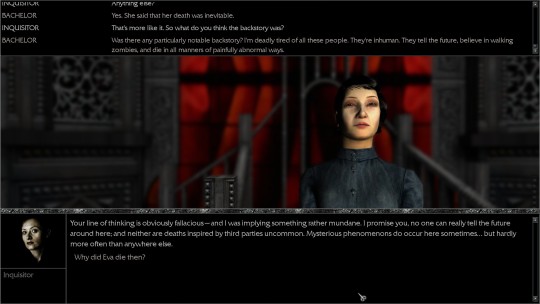
Bachelor: Was there any particularly notable backstory? I’m deadly tired of all these people. They’re inhuman. They tell the future, believe in walking zombies, and die in all manners of painfully abnormal ways. Inquisitor: Your line of t hinking is obviously falacious - and I was implying something rather mundane. I promise you, no one can really tell the future around here: and neither are deaths inspired by third parties uncommon. Mysterious phenomenons do occur here sometimes… but hardly more often than anywhere else.
actually, there’s an example of him saying something similar to artemy on day 5 in pathologic 2:
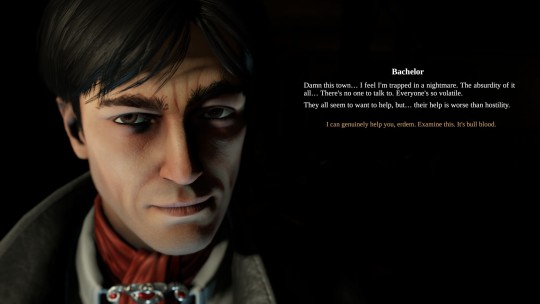
Damn this town… I feel I’m trapped in a nightmare. The absurdity of it all… There’s no one to talk to. Everyone’s so volatile. They all seem to want to help, but… their help is worse than hostility.
some of this can be explained by the town’s strangeness, but keep in mind that the first instance happens after he’s been there and involved in the ongoing for an entire week, and the second at nearly a week in. clearly he’s struggling to adjust to the changes.
it’s also worth noting that his reason for fleeing the town in the nocturnal ending?
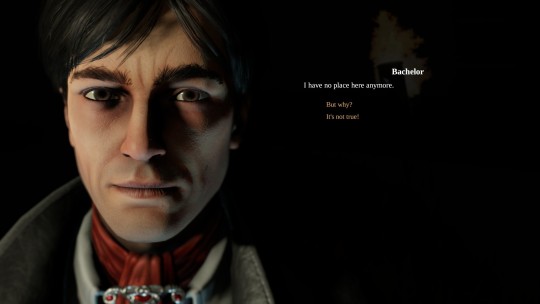
I have no place here anymore.
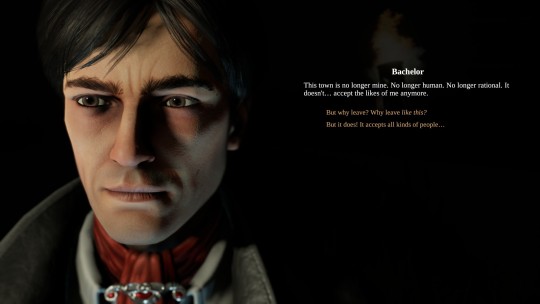
This town is no longer mine. No longer human. No longer rational. It doesn’t… accept the likes of me anymore.
repetitive motor movements or speech
it’s harder to see the motor movements in classic, but remember how i pointed out earlier that he paces? pacing is a form of stimming. murky, who is canonically autistic, can also be found pacing as one of her idle animations. having stock phrases for characters to speak when you come near them already ticks off the box on “repetitive speech”, but that by itself doesn’t really cover what they’re talking about - echolalia.
but you know what this does fit with? ���‘quoting’ things(communication is HARD! sometimes we need to take shortcuts and use someone else’s words)“
i’ll get to the more obvious example in a minute - i want to point out something that happens very early in pathologic 2 first. you know how you first meet him and artemy accuses daniil of trying to guilt-trip him by asking if it’s true that isidor would still be alive if artemy had come sooner? keep in mind that he spoke to rubin first. and this is what rubin says, when you get a chance to talk to him:
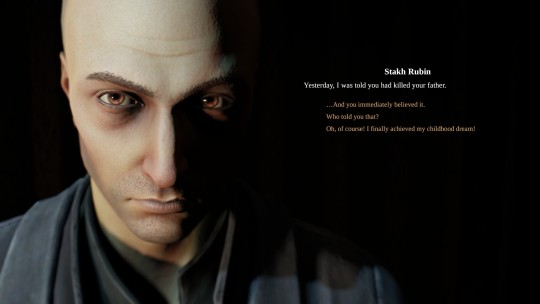
Yesterday, I was told you had killed your father.

That’s not far from the truth, Burakh.
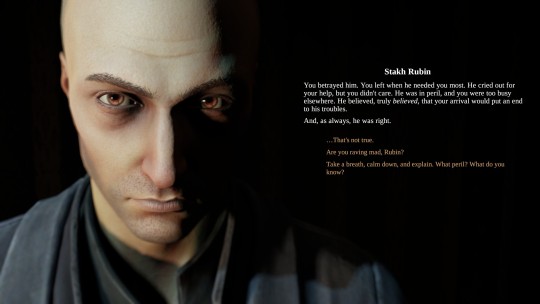
You betrayed him. You left when he needed you most. He cried out for your help, but you didn’t care. He was in peril, and you were too busy elsewhere, He believed, truly believed, that your arrival would put an end to his troubles. And, as always, he was right.
i’m not saying this was necessarily the game’s intent, but it’s entirely possible daniil is parroting back to artemy exactly what rubin said to him.
now, for what you’re probably expecting in this section: the latin. people love to refer to his use of latin as “random”, so let’s clear that up:
it is not latin daniil has made up. with the exception of latin that is mispelled in the game’s texts, all of them are proverbs or otherwise common sayings. you can find most of them on the wikipedia list of latin phrases, or through a 3-second google search.
he’s a doctor. him having taken latin isn’t anymore strange than a lawyer taking latin. in fact, if you pay attention, artemy also took latin; this is implied when artemy tells him he’s always sucked at it.
his uses of latin actually aren’t random at all. what he says fits the situation, and sometimes is used in place of him having to come up with something to say on his own.
prime example:
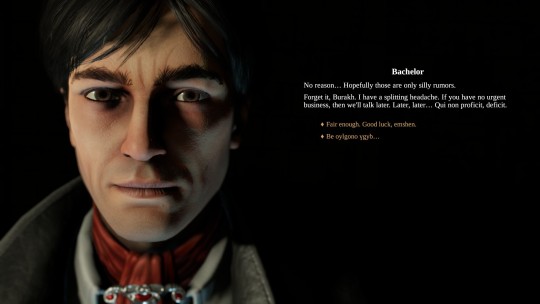
Forget it, Burakh. I have a splitting headache. If you have no urgent business, then we’ll talk later. Later, later… Qui non proficit, deficit.
qui non proficit, deficit - he who does not advance, loses ground. in other words, “i’m sorry, but i really do need to keep working.” one of his voice lines.
as for why he doesn’t translate the latin: it probably wouldn’t even occur to him to. these are not obscure sayings. the utopians all have a certain degree of education - what would he need to translate them for?
this bleeds into something that isn’t really mentioned, but that i’ve found i have a lot of trouble with in everyday life. autistic people have a tendency to either overexplain (and then have everyone get mad at you because they feel you’re being condescending) or underexplain (and have everyone get mad at you because you haven’t explained anything). the latin would be a case where it feels like a justified underexplanation. you’ll notice that when it comes to anything scientific, he tends to do the reverse, and overexplain. this also happens in classic, whether artemy has asked him to clarify or not.
rigid thinking patterns
the thing i had marked for this was simply his strict adherence to western medical practices and refusal to acknowledge the supernatural, even when it seems obvious - he has a conversation in his route in classic with yulia about this, and that is in fact how he manages to get to her: by asking saburov if there are any other logical skeptics in town. it should be noted they seem to be breaking with this in pathologic 2, where one of his voicelines is “I’m no positivist. There are things in this world beyond our mundane perception.” i have no idea where they’re planning on going with that.
there’s also a quote floating somewhere around twitter about him having been raised by a military man, and militaries tend to enforce very rigid routines. you could say the same thing of block - who (in classic at least) i also have my suspicions about.
highly restricted, fixated interests that are abnormal in intensity or focus
special interests. the one that should obviously come to mind is thanatology, though i would argue latin if not classics in general is a special interest of his as well - in addition to his usage of latin, he also references pericles in the marble nest and was probably refering to the roman occupation of haruspicy in addition to augurs in the same text. he also makes references to shakespeare more than once in both marble nest and pathologic 2.
hyper- or hyperoreactivity to sensory input
i don’t have much written down for this one but there seem to be several places in classic especially where he asks npcs to stop shouting at him. we don’t really have the privilege to know their volume or how they’re interacting with him, but i think it’s also worth noting that he’s the only one of the healers who wears gloves. in pathologic 2 he’s the only named character i can think of who wears them at all. his thing in the lucid dream about the brain being “a border”? gloves are his border, as is his jacket, which may be worn to cut down on sensory issues.
he will also sometimes seem to “overreact” to the situation at hand - such as in classic, when some dogheads mispeak and say that daniil is going to “sterilize” them, and instead of understanding that they must have mispoken, freaks out over the idea that they think they’re going to be… well… sterilized. or in haruspex route, when his reaction to the inquisitor arriving is to threaten suicide.
miscellaneous
he never goes anywhere without that carpet bag. we don’t see it in pathologic 2, but we do hear about it and he doesn’t let it go for a second in classic - not even in the cutscenes where he’s using the microscope. his bag could be a comfort item.
“getting very attached to things like inanimate objects” could work for the bag - but you know what it actually fits the bill much more obviously? the polyhedron. in the haruspex route he recognizes that it’s a lost cause, but he’s still too attached to it to let it go.
in classic at least, daniil is absolutely terrible at lying. most autistic people either are not good at lying, or feel uncomfortable or anxious with having to lie. when he’s asked by yulia and the kids in the polyhedron to lie to block (for different reasons) he’s clearly uncomfortable with the idea that it’ll work. and when it actually comes time to come up with a way to lie to block about why he needs five rifles, your options are to either buckle and tell him the truth, or simply say that you need them for “self-defense”. block believes that you’re not lying to him, but daniil can’t come up with any embeleshments to explain why he needs what he’s asking for.
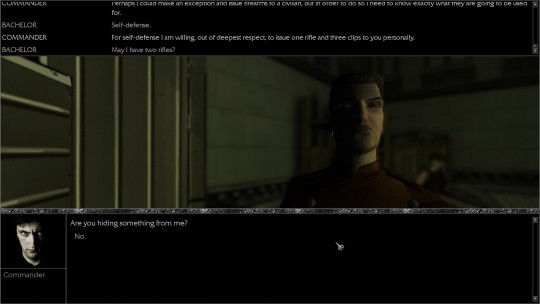
Commander: Are you hiding something from me? Bachelor: No.
he comes across as naive to other characters. in classic, capella has a voiceline saying, “The Bachelor is not smart. Intelligent, yes… but not smart.” in Pathologic 2, Daniil complains that Aglaya takes him for “a useless dreamer”. he’s also easily used by the Kains to fulfill their endgame in classic.
my final, and absolute favorite: he takes things way too literally. autistic people (and adhd people, from my understanding) have a hard time differentiating jokes and sarcasm. so my favorite moment in marble nest is a case of him taking that earlier advice - to “take heart” literally, by bringing the tragedians a literal human heart:
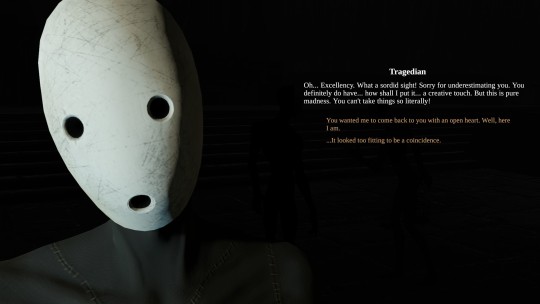
Tragedian: Oh… Excellency. What a sordid sight! Sorry for underestimating you. You definitely do have… how shall I put it… a creative touch. But this is pure madness. You can’t take things so literally! Daniil: You wanted me to come back to you with an open heart. Well, here I am. …It looked too fitting to be a coincidence.
your mind map, after this, updates to say “I misunderstood the tragedians.”
conclusion
people don’t stop being autistic with age and i think he’s a good example of what it’s like to be in your late 20s and be autistic. i’m sure i missed things as i haven’t finished haruspex route of classic yet and there may just be some other things he does or says that i missed! if anyone has anything to add they think fits i would love to know, thank you for your time :)
#icarus.txt#autistic daniil dankovsky#daniil dankovsky#pathologic meta#ok to rb but i'm not interest in your ''but he's just weird!'' arguments#please keep in mind that this post is about autism#and that this is written by someone w autism...#popular
333 notes
·
View notes
Text
John’s “therapeutic” blog
I’ve been fascinated by the wealth of content in John Watson’s blog since I first noticed it; I think it was some time after S2. For being a complementary work to a TV show, it’s surprisingly well crafted and packed with information. Joe Lidster, who has written the fictional blogs and websites of John, Sherlock, Molly and Connie Prince, is a screenwriter who has been working also with Doctor Who and its spinoff Torchwood.
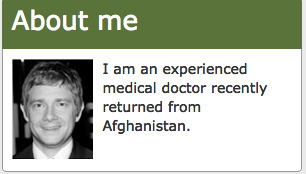
Unlike the rest of the content within the BBC Sherlock franchise, for example the online game ”Sherlock the Network”, the escape room “The Game is Now” or the book “Sherlock Chronicles”, John’s blog is fully available online for free, you don’t even have to register anywhere. And unlike the other blogs of the franchise (Molly’s and Connie Prince’s blogs and Sherlock’s website), John’s blog is lengthy and has a lot of posts in it. It gives us background and explanations of cases that aren’t mentioned in the show, or only referred to, and I also think it provides a “second opinion” of what we see in the show. It’s a bit like what John says in TLD:
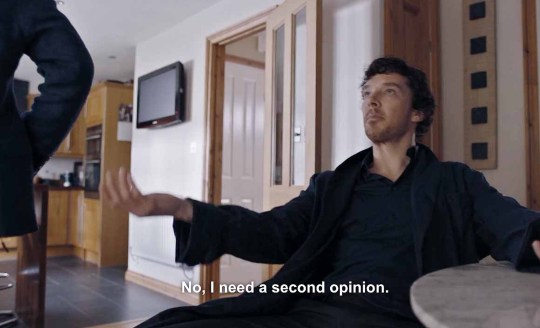
It certainly seems like this blog has been created as a special little treat for the fans, since most of the casual viewers of the show probably don’t even know it exists ‘IRL’. But I think the blog is much more than that; partly because it’s so heavily referenced in the show – with frequent, accurate and exact pictures of it (at least until S4) – and partly because it tells us so much about John’s character. I think John’s blog is significant and important in trying to analyse BBC Sherlock. And maybe the version of John we see in the show will actually get more nuances to it if we look at the blog, which is expressly written by John himself?
More under the cut.
As some of you might know, I’ve written a meta series (X) where I try to explore the idea (originally from @raggedyblue) that the blog describes the ‘real’ events in John’s and Sherlock’s life more accurately than the show, and that what we see in the show up until HLV is Sherlock reminiscing their life together while reading up on the blog. In my view, the show might be Sherlock’s embellished and dramatized version of the events - ironically a bit similar to what Sherlock usually accuses John of doing in both Doyle’s canon and on the blog. But I find the blog’s writing style far more prosaic than the show, and also more prosaic than Watson’s stories in ACD canon; in BBC Sherlock the roles might have been inverted compared to canon.
An example of this would be the scene in TEH (which I talked about in this meta over a year ago) where Mary is (supposedly) reading the following un-published post directly from John’s blog editor:
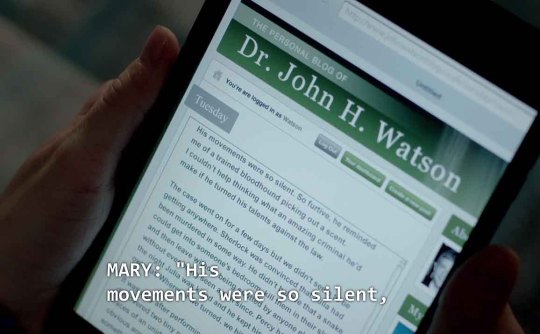
“His movements were so silent. So furtive, he reminded me of a trained bloodhound picking out a scent. I couldn’t help thinking what an amazing criminal he’d make if he turned his talents against the law.”
Something doesn’t seem quite right here, though. While the rest of the post is text from another, already published, post (The Speckled Blond), this first part is taken almost verbatim from ACD’s story The Sign of Four (SIGN). It describes a crime scene where Holmes has just “whipped out his lens and a tape measure and hurried about the room on his knees, measuring, comparing, examining, with his long thin nose only a few inches from the planks and his beady eyes gleaming and deep-set like those of a bird”. I see a big style difference between this and the rest of John’s blog. Since the quote above never appears on the ‘IRL’ blog, I’d rather believe that in BBC Sherlock this is merely wishful thinking from Sherlock that happens inside his Drama Queen Mind Palace. This impressive description is, I think, what he would truly wish that John had written. ;)
I also suspect that the continuing references to different blog posts in S4 are all made up in Sherlock’s mind, since John’s blog ‘IRL’ stopped updating after TSoT, when Sherlock hacked it and took over the storytelling.
Be that as it may, this meta is a reflection upon what John Watson’s famous blog actually might stand for, and what I believe it tells us about his character. In these months of quarantine, I’ve been passing the time by reading through the whole online version of the blog and taking notes of it.
Therapeutic origin
It seems like the initiative for John to start a blog came from Ella Thompson, his therapist. I believe Ella’s initial idea was therapeutic; if it was almost impossible for John to talk to her about his feelings and inner problems in their sessions, she might have found it difficult to help him. Therefore she suggested that he write it all down on his own instead. And if Ella could persuade him to talk about his life on an online blog, she would also be able to read it.
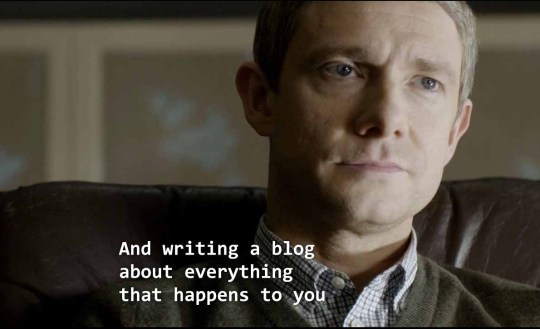
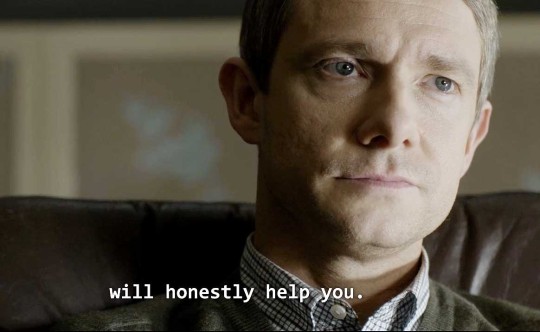
Of course this wouldn’t be the same as if John told her about his inner reflections in confidence, in a real therapy session, but maybe the blog would give him an incentive to talk about his life at all. And you have to start somewhere.
At the end of TST we see Sherlock visit Ella, but when she asks him to “open up completely” he refuses.
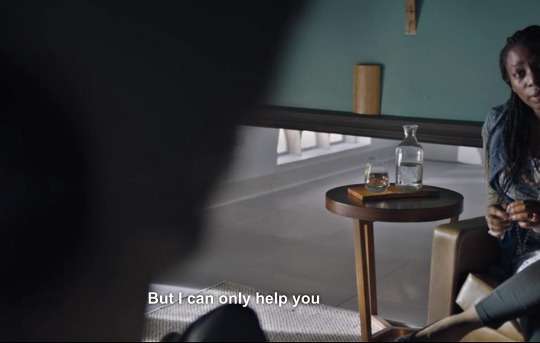
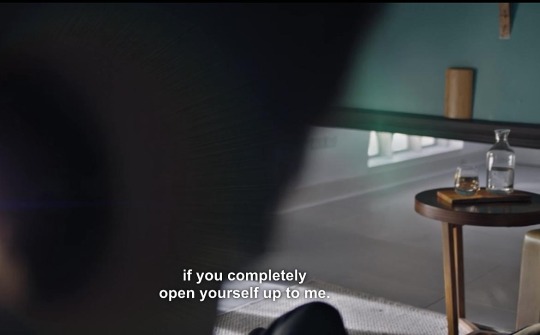
If S4 is happening inside Sherlock’s head (as I believe it is), this might have been Sherlock’s way of trying to psychoanalyse John, to ‘solve John’s case’, by envisioning the therapy situation in his mind palace. A well-known method of Sherlock Holmes is that he tries to put himself in the other person’s place and think about what his own response would have been to the situation. In ACD’s story The Musgrave Ritual (MUSG), Holmes says: “You know my methods in such cases, Watson. I put myself in the man’s place, and, having first gauged his intelligence, I try to imagine how I should myself have proceeded under the same circumstances.”
Which is also evidence that the character of Sherlock Holmes does indeed not lack empathetic capacity. Also in the show, John’s assertion that Sherlock “doesn’t feel things that way” etc. is basically BS in my opinion. The problem is that John refuses to see this.
John’s state of mind before Sherlock
John’s first three blog posts (in the middle of December - January) seem to completely lack motivation.

And this is maybe what one could expect from the deeply depressed John (as he appears in the beginning of the show), isn’t it? No surprises there.
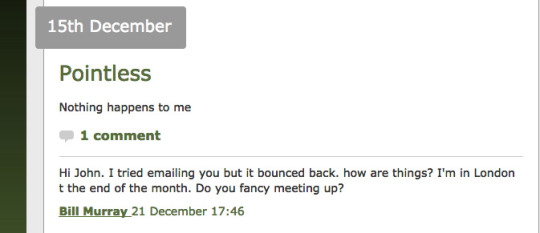
Everything seems meaningless, and John only makes two attempts at blog posts to comply with Ella’s recommendations, but he doesn’t actually write anything in them. After the second attempt his old army friend Bill Murray tries to contact him, but John seems to have cut off his ties with the rest of the world; he doesn’t answer the comment.

At the third attempt over a month later, John seems to want to delete the blog he has started, but lacks the technical knowledge to do so. The fourth attempt is just a snide comment to Ella:

She doesn’t respond, however (not very surprisingly perhaps). Instead, John’s sister Harry discovers the blog and tries out this means of communicating with him. But John ignores her.
But at the fifth attempt at least John has gone out with some friends and describes it – almost bitterly. Sadly, it also seems like John met up with them mainly to avoid his therapy session with Ella.
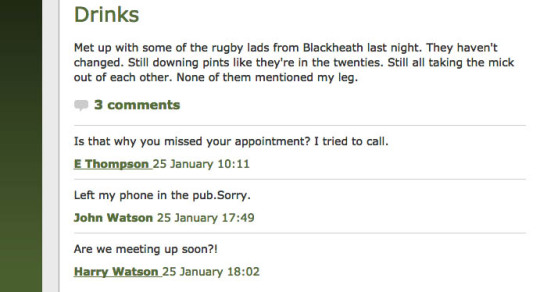
So, the problem is that whatever Ella may have thought that the blog would mean for John’s healing, I think she aimed well but unfortunately missed the target. John Watson does not ‘open up’ himself on the blog. When he finally starts to really write - after he met Sherlock - it’s not actually about him (supposedly); it’s all about Sherlock. Basically, John goes directly from ‘Nothing happens to me‘ to ‘Sherlock happens to me‘.
What the blog tells us about John ‘after Sherlock’
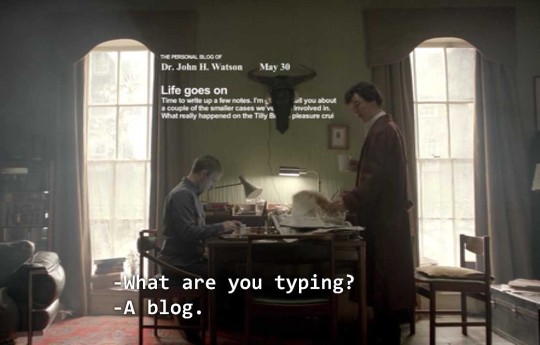
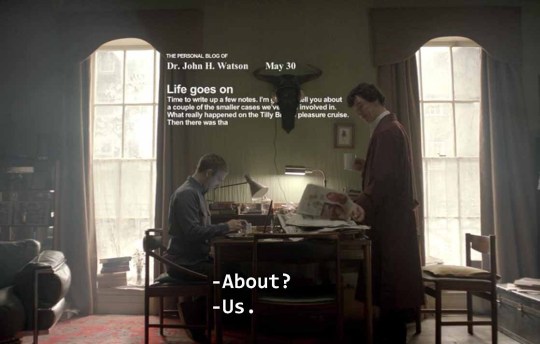
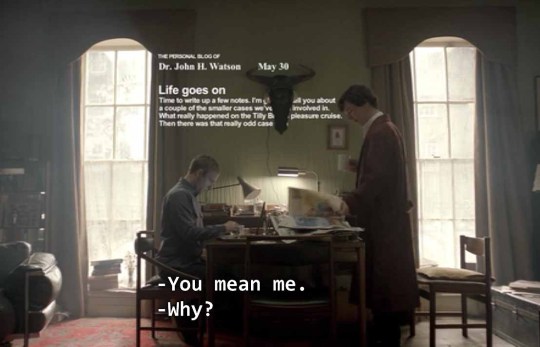
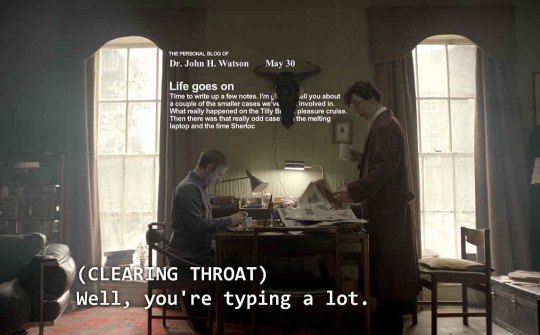
John’s blog may be all about Sherlock, but there isn’t actually that much praise for Sherlock in the blog posts as one might think. My impression is that John applies his (perhaps somewhat overestimated) writing skills to project his own failures and self-loathing on his closest friend. More than anything else, I think the blog is John’s emotional outlet for his frustration over his unsatisfactory relationship with Sherlock and his own inability to improve it. Instead of trying to actually talk to Sherlock, he uses the blog to vent his frustrations over Sherlock, speculating wildly about what he believes Sherlock is thinking and feeling.
The stories and adventures are thrilling and entertaining, yes. But his assessments of Sherlock’s character are really not very uplifting. John doesn’t strike me as an ‘analytic’ person, which in this case means that John’s theories about Sherlock are rather based on his personal emotions than logical conclusions. It’s sometimes even a bit difficult to follow the chain of events in John’s posts, because it’s usually so intertwined with his gossipy and out-of-context comments about Sherlock’s personality.
Unfortunately, Sherlock doesn’t seem to realise this projection, and neither do we see him address the issue of John’s misconceptions about him. I believe Sherlock takes many of John’s jibes and insults at him at face value, which – sadly - only adds on to his own self-loathing. I also think that Sherlock trying to draw conclusions about his mysterious friend through the written blog might be a mistake; it may eventually tell him a lot about John’s problems, but to see these he needs to look behind all the cover-up of blatant criticism of him, Sherlock. Maybe that’s what Sherlock’s trying to do in S4, by setting up scenarios in his mind palace?
Judging by how John comes across on the blog – and in the show – I think Sherlock’s claim “You’re abnormally drawn to dangerous people and places” in HLV is a perfectly sound analysis - on the surface. However, I think one must read between the blog lines in order to see other possible motives for John wanting to hang out with Sherlock. Reading John’s posts textually, he gives a strong impression that he’s there for the adventures; when there is danger in the air, John’s never bored.
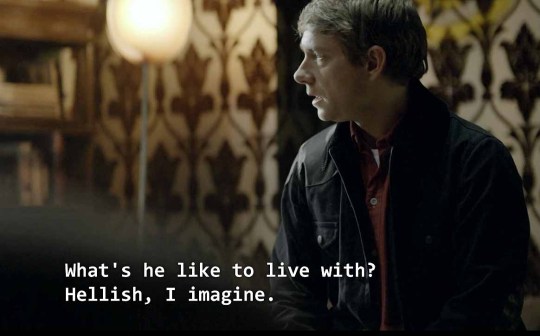
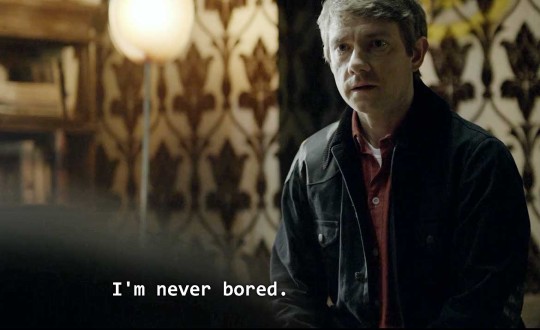
In the comment section Sherlock never mentions John’s evaluation of his character. Instead he repeatedly criticises John’s writing style. I get the impression that this is Sherlock’s subtle way of getting back at John without having to directly address John’s misconceptions about him. As I said above, I think John’s writing style is very different from Watson’s style in canon; far less respect for Sherlock and a far more prosaic and simple language. Canons Watson seems careful not to speculate much, while John does this all the time.
Examples that form a pattern

There’s a good deal of praise of Sherlock in John’s posts, but it has almost exclusively to do with his admiration for Sherlock’s intellectual capacity; he’s repeatedly described as ‘clever’ and after the Fall, John claims that “nobody ever really outwitted Sherlock”. But in fact, I’ve found very few blog posts where John doesn’t also criticise or complain about Sherlock in some way or another. And there are only two posts (out of a total of 45) where John says something positive about Sherlock’s character:
1. After their first meeting he calls Sherlock “strangely likeable” and “charming”.
2. In what John meant to be his last post ever (he believed Sherlock was dead), he calls Sherlock “funny”, “charming” and “everything a good person should be”.
On the other hand, there seems to be nothing in John’s own (supposed) opinions about Sherlock that he regards as too negative or inappropriate to publish online. I very much think this is about self-loathing; he projects his own shortcomings on his “psychopath” friend and flatmate. Like it’s always a relief to have a scapegoat. An additional explanation might be that if John is closeted and in public denial about any romantic feelings for Sherlock, this makes him not want to appear too ‘besotted’ on the blog. ;) Thus, he might believe he needs to compensate the praise with criticism. Problem is, with this contradictory approach the readers might ask: What is John’s actual relationship to Sherlock? Handler? Hostage? Lover? Concerned citizen? It’s hard to claim he’s a ‘real’, professional colleague, since John’s actual profession is a medical doctor. But why would John be friends with a psychopath?
To seriously claim that his best friend is a psychopath seems perfectly OK to John, though – he does it repeatedly, and quotes Donovan’s claim that Sherlock “gets off on it”. At the end of A Study in Pink, John talks about Sherlock and the serial killer as if they were both psychopaths, one undistinguishable from the other:
“The taxi driver drove him to a college of further education so they could both educate each other on - well, on how their minds worked, I guess. It's not something I'll ever really understand and, to be honest, I'm not sure I ever want to understand it. To be that much of a psychopath. To be that above the rest of us.”
John even seems to pretend to prefer ignorance to understanding, only to find one more opportunity to blame Sherlock. Here are some examples of other things John calls Sherlock publicly on the Internet:
Arrogant
Rude
Imperious
Pompous
Madman
Freak
Childish and
Not safe.
He also says on the blog that Sherlock is spectacularly ignorant about some things, like the solar system.
Little Freudian slips
In the post titled The Speckled Blonde
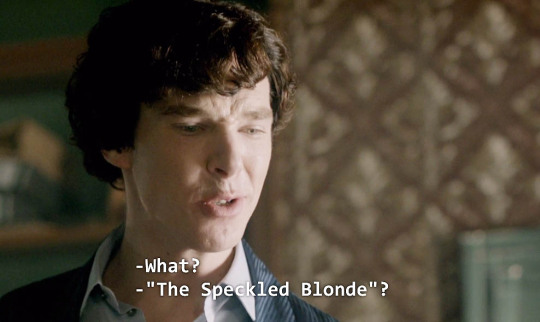
(which is basically a re-count of canon’s The Speckled Band - SPEC) John’s closet angst reaches new heights:

Apparently John finds it important to preventively point out to his readers that he was not sharing a bed with Sherlock. Or, actually, that he even preferred sleeping on the floor before sharing a bed with his flatmate. The thing is, however, that the information that they spent the night in Julias bedroom isn’t at all necessary for the story, since - unlike in ACD Canon - nothing of importance apparently happened during that night. John actually tells us nothing about the night as such. The only ‘feature of interest’ is that Sherlock found a suspect bottle of bubble bath on the victim’s night table, which he took to Barts for analysis (and he was right - the bath had killed Julia by poisoning). Obviously, John could have described this crime scene investigation entirely without mentioning that they had spent the night there. So, if this little morsel of information was so embarrassing for him, why did he even include it? Hmm...
In my biased mind, I can only think of two alternative explanations (not mutually exclusive, though): 1. John had spent so much fantasies and subconscious energy on reliving this night that he just couldn’t keep this info entirely to himself (Freudian slip), or 2. Something actually happened that night - something that had no bearing on the case. After all, John never says that he slept on the floor, only that he was going to sleep on it. ;)
Speaking of bubble bath, I find the fact that Julia died from it slightly suggestive, and even metaphorical, as such. Because there’s also another case on John’s blog describing someone dying in a bath: The Deadly Tealights. The victim suffocated in a bathroom where the candles consumed all the oxygen. John has included this little comment:

Why does John bring up the idea that a person taking a bath with candles would potentially be judged? What has his own bath routines to do with the crime case? Does the victim really need John to find excuses for his private life? Methinks this rather might be John’s closet angst speaking again. Someone has tried to belittle John for liking baths, and apparently John seizes the opportunity to vent about it on the blog. Metaphorically, this tells me that the closet is suffocating for John, and that the ‘chemistry of love’ is involved.
John - The Moral Compass
John is often referred to as the part of the duo who a) is more sociable and b) works like a sort of moral guide to Sherlock. The detective, on the other hand, is shown as a “sociopath” who supposedly doesn’t understand this kind of things. And – to be honest – Sherlock doesn’t actively say much to contradict this perception; sometimes he even appears to agree with it.
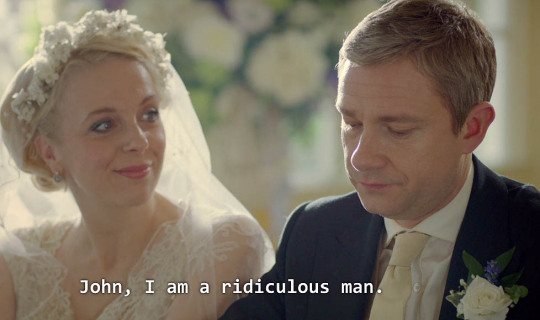
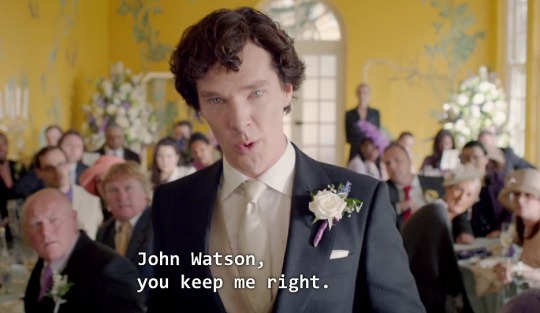
(I think his actions should be a clue to the contrary, though).
According to the blog, John seems to believe he himself is the adult one in this acquaintance, the one who does understand the rules of society. He repeatedly calls Sherlock “childish”. Judging by John’s descriptions in the blog, one might almost think that John had been forced to hang out with Sherlock, trying to do the best of it. But seeing as it’s entirely voluntarily it’s a bit hard to understand, for example, how John can blame Sherlock for “leaving me and Sarah to be kidnapped” in The Blind Banker:

John makes is sound like Sherlock left them to the enemy deliberately, knowing that someone would come after them. But weren’t they at home, supposedly on a date? If John didn’t like it, couldn’t he have left any moment and gone out to continue the date he was supposed to? But no; John counts himself among the innocent persons whom Sherlock “involves in his adventures”:

After reading the whole of John’s blog, all I can say is that this guy is a living, breathing contradiction. How can he be Sherlock’s moral compass if his needle is spinning all the time? :))
In The Great Game John describes himself as just a “pawn” in Sherlock’s and the killer’s great game, equalling himself with the other victims. With his insinuations, he indirectly blames Sherlock for the death of 12 people and goes back to Sally Donovan’s “freak” accusations:

Another interesting bit is this, describing Sherlock’s reaction at the pool, when John for a moment appeared to be behind everything: “I should have been horrified that he'd even doubt me for a second…” Wait – what!? John is capable of telling the whole world the most damning rubbish about his friend, but if Sherlock for any second doubted John, he’d be horrified? This part is also of interest: “But the laser sight simply moved to Sherlock's head and I was forced to let go. For a second, I wondered if Sherlock would have done the same for me but then all I knew for certain was, at that moment, I knew I was going to die.”
Before that, John had just described what could easily be interpreted as Sherlock calmly trying to talk Moriarty out of having John killed, but to John this was just “The two men talked, both clearly pleased to…”. In John’s view, he was the only one who was forced to let go of the killer because of the threat to Sherlock. Honestly, who is it, between the two of them, that most appears to lack empathetic capacity?
Creds and Competence
John appears to be a rather honest, humble and straightforward in the show, quite competent in his medical profession, and in TSoT he is highly praised by Sherlock:

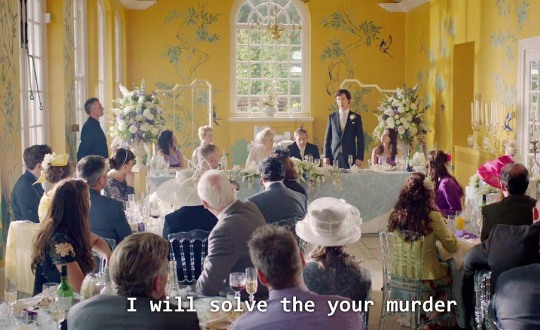
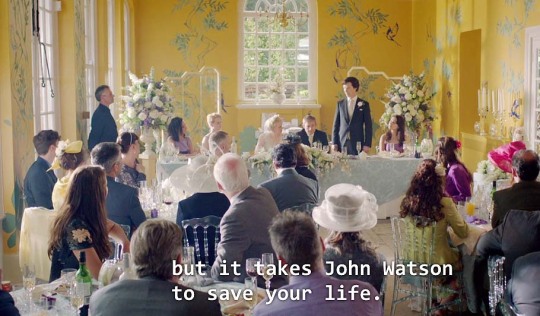
But on the blog John is more ambiguous, and he isn’t always modest. Sometimes he appears to enhance his own role in the crime solving and take credit also for things that are clearly Sherlock’s doing. For example, in The Great Game there’s this:
“Between us, we worked out that while Connie's death had been made to look like the result of a tetanus infection, it had actually been caused by poison - their houseboy, â–“â–“â–“â–“â–“, had overdosed her on Botox!”
But if we’re supposed to believe the show, John actually believed it was a tetanus infection, while Sherlock deduced and later demonstrated poison:
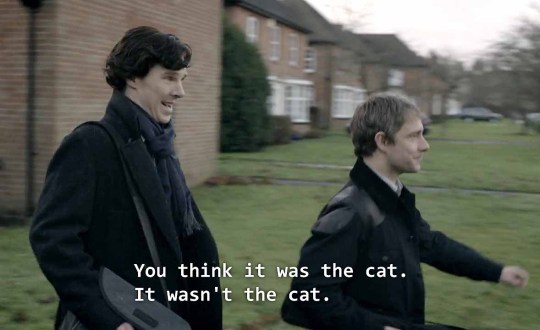
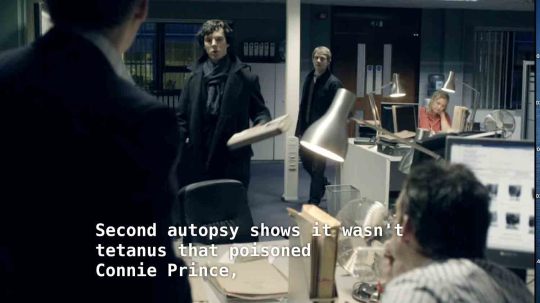
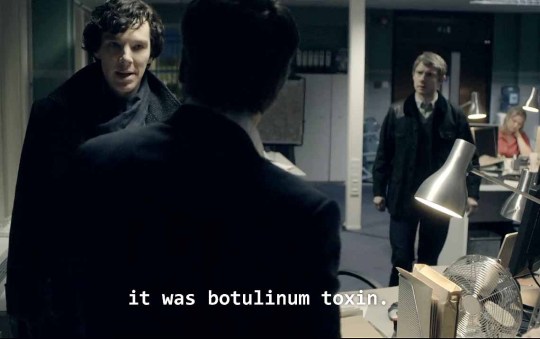
John also expresses a slightly childish vindictiveness in making a lot of fuss about Sherlock’s failures; every single time Sherlock can’t solve a case, John points it out on the blog with glee. It almost gives me the impression that the doctor is suffering from inferiority complex. He even uses “Sherlock Holmes Baffled“ as a title for one of their cases.

This seems to be written in jest, since Sherlock frequently is rude about other people’s lower intellectual capacity, but actually hates ‘not knowing’.
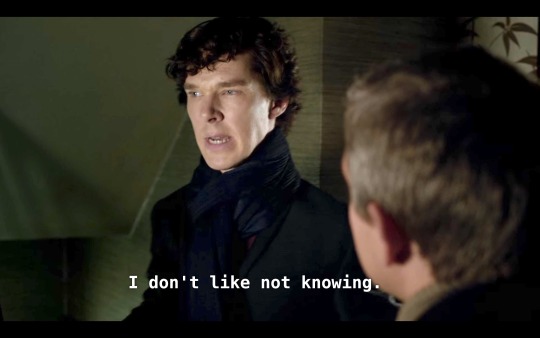
I admit that this may be funny to joke about once, but it gets a little tiresome that John has to point it out every time. Why does John even do this, even as Sherlock has explicitly asked him to not publish the unsolved cases? Which I assume would not be good for their business?
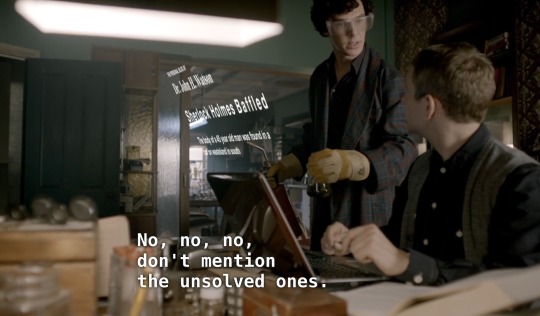
If John truly is Sherlock’s colleague, wouldn’t he also be more interested in helping to solve the cases, rather than talk about the failures? It seems to me that John is struggling so hard against his own feelings for Sherlock that he feels the need to provoke rather than help him.
The Most Inhuman Human
Sherlock’s supposed lack of humanity is a recurring theme for John; he claims that “people” want to know that Sherlock is human, as if anyone - on the blog or in the show - except John had ever questioned this.
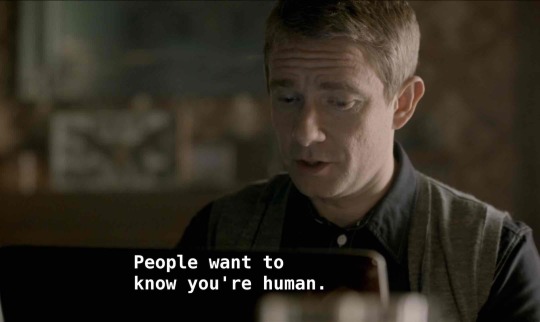
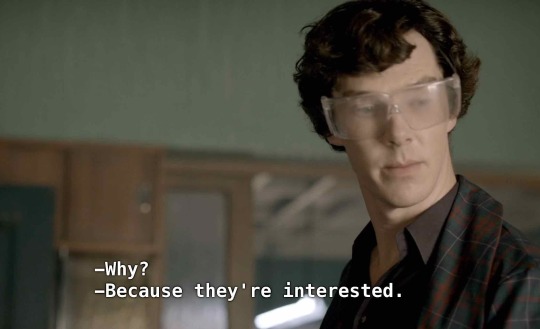
I can’t remember anyone on the blog except John showing an interest in this issue, though. In the post Many Happy Returns he writes this (my bolding):
“Yet the video... it showed the other side to him. He was rude, yeah. Arrogant. Apparently lacking in anything resembling empathy. But I'd forgotten just how funny he could be. He was so charming. So... human. It's bizarre because most people would say he was the most inhuman person they'd ever met. But he wasn't.”
He wasn’t? Wow - great revelation, John! [sarcasm :)]. But who said that, actually? Not even the haters and trolls on John’s blog ever claimed Sherlock was inhuman. It’s one thing that Donovan and Anderson called him a freak and a psychopath, but John is the only character I can think of who has ever implied that Sherlock would not be a human being. Only John calls him a ‘machine’. Which is a load of BS of course; John really doesn’t strike me as a professional doctor when he says this, even less as a friend - always trying to mark the distance.
So what’s Sherlock’s ‘complete lack of empathy’ in that video actually about (mini-episode here)? Was it because he didn’t want to go to a birthday dinner with people? Hardly - John seems to understand this about Sherlock. Or was it maybe because of his comment: “How can John be having a birthday dinner? All his friends hate him!” Well, this probably hurt a bit (even if I rather think he sounds bitter and jealous - he wants John for himself ;) ). On the other hand, Sherlock then backtracks and seems to regret his little outburst:
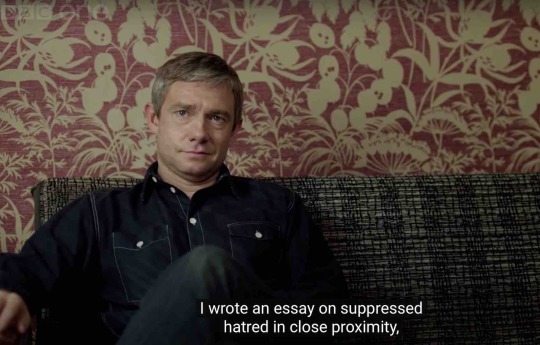
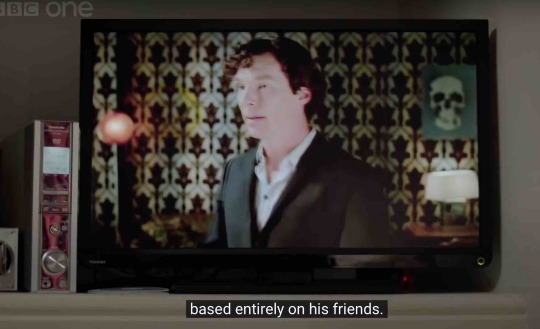
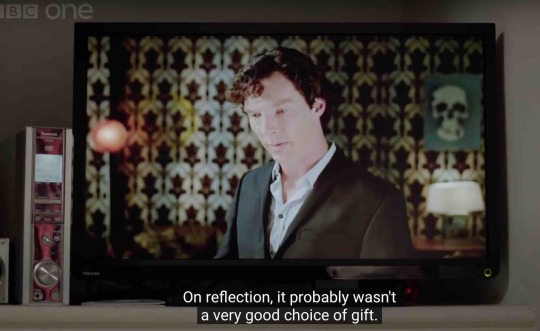
Mary’s role in John’s life
The blog is where Mary Morstan appears to be introduced to John; on John’s first blog post about at least a year after Sherlock’s ‘death’, she suddenly just shows up in the comment section, sending him kisses and inviting him out:

John ignores her, though, and when his sister asks him who Mary is, he doesn’t answer. Mary seems to hang in there, however, and the next time she appears is on the Deadly Tealights post (the one with the dead flatmate in the suffocating closet bathroom). And now she’s called Mary Morstan. Next time is The Inexplicable Matchbox. Both times her only comment is ‘ignore the trolls’. John rather seems to ignore her, though. Finally, he finishes his Many Happy Returns post (which was supposed to be his last) with saying that he has now “found someone” (without naming them) and should concentrate on that.
All this is a little bit weird, though, considering Mary’s comment in TEH, when she is logged in and reading aloud from the editor of John’s blog: “The famous blog, finally!” As if she hadn’t already read all his posts and tried to interact with him on the blog? Hmm.
In the show Mary just seems to come from out of nowhere, suddenly showing up in the graveyard holding hands with John.
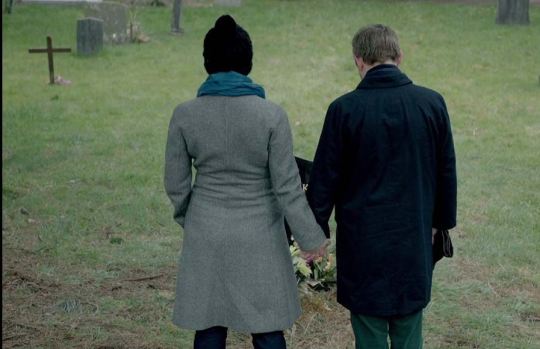
Her anonymity reminds me of Doyle’s treatment of Mary in canon, where she’s only mentioned by name when she’s still a client, before she marries Watson.
On the blog Mary is not mentioned by name until over a year after John met her, in spite of her presence in the comment section long before that. And it’s not until John’s first post after Sherlock’s return - The Empty Hearse - that John says something appreciative of her. Suddenly she is (still without name) "...the best thing that's ever happened to me. Sorry, Sherlock :)”. For the rest of the blog posts, John’s (very scarce) answers to Mary’s comments are never flirty or appreciative in the least. Mary’s own last comment, on the very last post - this time written by Sherlock who hacked the blog after John’s and Mary’s wedding - is this: “SHERLOCK! SHUT UP NOW!”
None of this gives me the impression that John has fallen in love with Mary. The silence with which he treats Mary on the blog rather makes me think of her as someone basically not very important; a sort of substitute in a desperate attempt to fill an emptiness in his life. And I think it might be significant that as soon as John recognises the existence of Mary in his life, he seems to use her as a sort of buffer towards Sherlock. A façade. First it’s the gleeful “Sorry Sherlock :)” comment above. Vindictive, it appears. And then, in the post Happily Ever After, John insists that his and Mary’s impending (heterosexual) marriage must clearly be the reason why Sherlock chose to help a gay couple getting together, one of them leaving an abusive marriage which was basically a façade. This whole ‘conclusion’ is so stupid that I’m rendered speechless.
Summary
To summarise - for those of you with enough patience to have followed all my ramblings in this marathon meta - I think the picture of John’s character that we can discern from reading up on the whole of his blog possibly tells us even more about him than the show. If the show reflects Sherlock’s mind, albeit almost entirely focused on his own perception of John Watson, this blog might actually give more insight into how John’s own mind works. I think it shows us someone who is struggling desperately with his own feelings. Someone who is trying to mark a distance that he believes is healthy for him, but that he actually doesn’t want, towards the object of his affection, by criticising them. The full-fledged, living, breathing contradiction that is John Watson comes to its full right by the blog. We could almost say he’s ‘human’ :). Kudos to Joe Lidster and the other showmakers for providing us with this gem.
Tagging some people who might be interested: @raggedyblue @ebaeschnbliah @gosherlocked @sagestreet @sarahthecoat @tjlcisthenewsexy @elldotsee @88thparallel @sherlock-overflow-error @yeah-oh-shit
217 notes
·
View notes
Text
Neuroessentialism and mental health
Hi!
Time for a little rant about neuroessentialism.
The aim of this post is to provide the opportunity to be conscious of the things that influence us when it comes the way we think about mental health and to challenge stigma around mental health.
First off, I’m not a doctor and the information here cannot serve as medical advice. Always consult your doctor before changing your medication or treatment approach.
Secondly, a lot of the information I present here is elaborated on and further discussed in an episode of the Psychiatry and psychotherapy podcast called “Free will in psychotherapy and psychiatry Part 3” and while I will link to as many things as I can, you can also find a lot of the source material on the website for the podcast. https://www.psychiatrypodcast.com/psychiatry-psychotherapy-podcast/2020/7/22/free-will-in-psychiatry-amp-psychotherapy-part-3
So, I see a lot of people talking about mental health on here through a neuroessentialist perspective in memes or text format and I don’t think they’re aware of it so. I’d like to talk a bit about it.
First, I’ll offer a definition of neuroessentialism:
" Neuroessentialism is the view that the definitive way to explain human psychological experience is by reference to the brain and its activity from chemical, biological and neuroscientific perspectives. For instance, if someone is experiencing depression a neuroessentialistic perspective would claim that he or she is experiencing depression because his or her brain is functioning in a certain way.” - Schultz, W. (2018)
I see people talk about, for example, depression in this way often: in memes when people say "I have a literal neurotransmitter deficiency, Karen." or " God forgot to add serotonin when he made me".
Now, why can this be problematic?
Before I get into the issues with this perspective, I will first acknowledge that one of the reasons this view has become so prominent lately is because it aims to reduce stigma around mental health issues.
In the podcast episode mentioned above they point out that “Efforts to reduce stigma should be praised, but they should also be critically analyzed to determine if they meet their goal.”
And that’s the thing neuroessentialism, while aiming to reduce stigma and shame it only does so short term and ends up contributing to stigmatizing attitudes about mental health.
I want to say that it's great to see people fight back when it comes to stigma around mental health. That's what I see people do in these memes. But the effects of neuroessentialist perspectives end up othering people; making them inherently “bad”, “defect” or “helpless”.
Here the deterministic aspect of neuroessentialism comes up - it tells us that there’s something wrong with our brain that we can’t change. It alienates people because it chips away at their and our belief in their ability to change. If you believe that someone's mental issues are rooted exclusively in brain biology, you're less likely to believe that they can control their behavior and so it is less worth the effort of getting them better. This brings about more stigma.
Another thing that’s important to talk about is how neuroessentialism is an extremely simplistic perspective on mental health. And that’s also one of the reasons it has become so big- because it offers a simple explanation to very complicated illnesses.
Here, I want to add a quote by Psychiatrist and psychotherapist Dr. David Puder:
“There are prominent theories out there that we know just aren’t true anymore and that get propagated because they are simplistic ways of explaining things; for example, depression is because you have low serotonin in your brain. That’s just not true. It’s a whole lot more complicated than that.
You could probably show 20 or 30 things that are going on in the brain during depression. Inflammation. Like initially I thought ‘oh depression is inflammation!’
Well, it turns out not all depression has inflammation. Maybe, only one third [of patients with depression] have inflammation markers in the brain.”
We have been looking to neuroscience for an explanation when it comes to mental health and been satisfied with the idea of a simple "chemical imbalance" but truth is that there are many more neurotransmitters which significantly affect our brains when we talk about depression – it’s so far from just serotonin.
Another example of how neuroessentialim can oversimplify mental health is with brain scans. So, in the podcast episode mentioned above, Dr. Puder talks about how he was really interested in emotions and especially studying anger and he was looking at all this research on the different areas in the brain involved in anger. After a while, he says, he began to understand that it’s really complex and you can’t just point at one area and say that’s the area that’s involved in the emotion anger. There are several areas involved in just that one emotion and different studies show different things.
The truth is that the manifestation of mental illness in the body is a very new area of research and we haven’t found physical manifestations for most mental illnesses and the important thing to note here is that despite this we still do have ways of treating all of them.
Alright, all this can seem quite removed from us so how does neuroessentialsim affect us?
In the episode the guest star, Mathew Hagele, further discusses the article which provided the definition on neuroessentialism above: “Shultz looked at studies investigating how patients viewed their own prognosis and later the same with professionals.
The study found that biochemical or genetic attribution scores were a significant predictor of longer expected symptoms duration and lower perceived odds of recovery.” (Lebowitz et al., 2013, p. 523).
Now, this means that the more a patient attributes symptoms of their psychopathology to genetic (inherited disorderes) or biochemical (serotonin deficiency for example) factors, the longer they expected to struggle with their disorder and the smaller the belief that they can recover.
If a person doesn’t believe they can be helped or get better they’re a lot less likely to try and a lot more likely to feel scared and hopeless.
The other side of this coin is the effect the neuroessentialist narrative has on clinicians which Matthew Haegel dives into in the next part of the quote:
“Another study shows that clinicians believe psychotherapy to be less effective when shown biological descriptions of mental health pathologies...
They took a couple different disorders that these clinicians were looking at and one group had a biological explanation and the other did not- had a different type of explanation. And [in] the results that were across disorders, the biological explanation yielded significantly less empathy than the psychosocial explanation. They also did some additional analysis and they found that biological explanations yielded less empathy than the psychosocial explanations among both MD’s and non-MD’s…..”( Lebowitz, M. S., & Ahn, W. K. (2014). )
So, in these studies we see that a neuroessentialist perspective lowers empathy for the patient in medical health professionals and people who weren’t medical health professionals.
Okay, so how does this perception of the patient’s illness affect the patient’s treatment?
I’ll start with a quote where Hagele elaborates further:
“…and finally, that clinicians perceive psychotherapy to be significantly less effective when symptoms were explained biologically than psychologically…[ Lebowitz, M. S., & Ahn, W. K. (2014). ]
basically, linking the idea that the diminished importance of psychotherapy among mental health professionals ascribing to the concept of neuroessentialism is doubly harmful when considering the multiple contexts in which psychotherapy matches or outperforms pharmaceutical interventions.”
What Hagele points out here is the way neuroessentialism can lead to a less effective and ethical treatment of mental illness. It makes us approach an issue in one manner only- fix the brain, fix the behavior. But sometimes what can treat he issue in the brain is, working on the behavior. This can be talked about in terms of meds vs. psychotherapy.
So, seeing mental health from a neuroessentialist perspective, completely excludes the effects of psychotherapy. A classic example is CBT (cognitive behavioral therapy) in which we have “Cognitive restructuring”: a psychotherapeutic process in which a person learns to recognize maladaptive or distressing thoughts and teaches their brain to consider other perspectives or different thought pattern. This is an example of “work on behaviour to better brain” rather than “working on brain will fix behavior”. According to strict neuroessentialism therapy shouldn’t work as well as it does but there is a really big body of science backing psychotherapeutic intervention and its efficacy compared to psychopharmacological intervention.
I feel I should address the discussion of Meds vs. therapy before I continue, (it is a whole topic worthy of a post on its own) but to be brief, they work best together and if you’re weighing one against the other psychotherapy has more long-term effects and barely any side effects compared to medication. There are other factor affecting what would be the most effective treatment approach that further nuances this discussion.
Now this is all a pretty big picture but how is this seen every day?
Well, its seen in the downplaying of the importance of therapy. Often, I see this as people normalize behavior where they kind of devalue the importance therapy or put off working on their issues in therapy with the excuse that it’s only for “crazy” people or not something worth the effort.
Therapy then increasingly is seen as this unimportant, extra thing rather than, in most cases, the most effective and safe treatment. And the less crucial therapy is considered, the less accessible it’s going to be – in the U.S. it can often be easier to get your insurance company to cover for a doctors visits where the treatment would be for your GP to prescribe you an antidepressant than an inpatient or outpatient treatment with a mental health professional.
Another point I wanna put out there is that that neuroessentialist narrative is incentivized by pharmaceutical companies. Dr. Puder talks about his own experience in the podcast episode and makes sure to stress that practitioners are humans too and will of course be biased towards something if that something writes them a check or pays some of their expenses. In the episode they discuss a way in which we have seen the neuroessentialist narrative progress:
“Second, there is evidence that the significant increase in direct-to consumer (DTC) advertising for antidepressants is related to rising prescription rates (Park & Grow, 2008). Such advertisements portray depression as a biological medical condition that can successfully be treated with medicine (Lacasse & Leo, 2005; Leo & Lacasse, 2008)” (613).
Now, medicine is an important tool in psychiatry and there is a lot of unnecessary stigma around medication for mental health conditions. I am under no circumstances arguing that medication is bad and therapy is the only right way to treat mental illness. That would be an extreme simplification and invalidation of human experiences. I also wanna acknowledge that being able to go to therapy in many places in the world is a matter of privilege. Therapy simply isn’t accessible for everyone and people can choose an “only medication approach” for many valid reasons. And if that’s the only treatment that was accessible to you I’m really proud of you for taking care of yourself and doing what you can.
If your doctor has prescribed you a medication please take it and know that the purpose is to help you and that you are worthy of help and good health care. The situation where I would suggest to be a tad critical is when people come in with disorders and issues that they have dealt with for years and most of their life and they are just prescribed an antidepressant and sent home. That simply isn’t effective and ethical care. In that case it is worth investigating getting access to a mental health practitioner as well as continuing with medicinal treatment.
I could talk about this for hours but the last thing I wanna get across is that this is a societal problem. I don’t suggest we turn away from pharmaceutical intervention which saves thousands of lives and helps people get better, rather that we work to make psychotherapy (which can be and is crucial for long term remission and recovery) more accessible for when it’s appropriate.
When your doctor tells you that this invisible illness is because of your biology most people feel validated and experience less shame. The fact that people feel like they need to have a tracible biological “anomaly” in their brains to be worthy of treatment and care speaks to an invalidation that many feel. But the issue here is that we're taught to invalidate invisible illness in society which in the end makes people delay critical treatment or blocks access to ethical and effective care.
We also have to acknowledge that with the technology we have now we are not able to know whether all mental illness manifests in the brain in a way we can see so hinging our worthiness of help and care on the definition is in the end harmful.
TL;DR
" Neuroessentialism is the view that the definitive way to explain human psychological experience is by reference to the brain and its activity from chemical, biological and neuroscientific perspectives. For instance, if someone is experiencing depression a neuroessentialistic perspective would claim that he or she is experiencing depression because his or her brain is functioning in a certain way.” - Schultz, W. (2018)
Neuroessentilism can validate a patient and bring relief of shame short term but ends up contributing to stigmatizing attitudes and thus doesn’t help reduce stigma overall.
The neuroessentialist narrative can downplay the efficacy and criticalness of psychotherapeutic intervention
Neuroessentialist perspectives foster lower empathy levels for patients in medical providers and non-providers alike.
Neuroessentialist perspectives of a patient significantly increases levels of prognostic pessimism which leads to worse treatment outcomes
Neuroessentialism arose because of a real invalidation people feel around their mental health and it is a societal issue we need to work on
We can combat neuroessentialism and stigma by working to make psychotherapy more accessible and talking about our experiences openly as well as giving each other kindness and empathy.
#i tried to make this a readable as possible but shoot me a message if i missed soemthing#neuroessentialism#rant post#mental health struggles#recovery data#psychiatry#medication#psychotherapy#therapy#psychology
13 notes
·
View notes
Text
Unpacking some of Dave Portnoy’s statements from his video about the NWHL.
I also watched Dave Portnoy’s video and was thoroughly disgusted with just about everything he had to say. I felt like certain things from his video are a little hard to understand if you're not familiar with the context of them. So, I’ve compiled a list of quotes from the interview, as well as my own thoughts on each of the quotes. If you are so inclined, the video can be found on his Twitter. Here we go:
“I didn’t wanna do this and I was thinking I wasn’t gonna do it because most people probably don’t even know what I’m about to talk about is going on. I’ll only draw more attention to it and the people who don’t like us will drag us.”
He’s right, in a sense. Since he’s Dave, and cishet white men love Dave, a bunch of people who don’t know what’s going on are suddenly going to be invested in what’s happening with the NWHL. However, people who don’t know about the league or the league’s goals are now going to be attempting to occupy and criticize a space that was not made for them, with no knowledge of the contexts of the league culture or values, etc. Dave backhandedly presents this “attention” as a good thing (no surprises there), but it really is not.
“Three of the top four executives outside of me are female. But we’re sexist. We’re just doing it for looks, just having basically an entire female executive board take us from a small company to one of the most successful media companies in the world, but we’re just doing it for show. Whatever.”
This, my friends, is called tokenizing. Dave is using powerful women within a company to promote a non-sexist image. What Dave is failing to acknowledge is that part of his own image as a hardcore, blunt personality was built around bashing much younger women. What Dave is also failing to acknowledge is that Barstool, as a whole, promotes the objectification of women! Again, no surprises here. It even has a whole section called “Smokeshow of the day,” which is essentially pictures of attractive women.
“[Erika is]…probably the number one supporter of a league called the National Women’s Hockey League. You probably didn’t know it existed. The only reason I know it existed—don’t let the headlines fool you—is because 2013, a girl, Denna Laing, got a spinal cord injury playing in the Winter Classic in Boston, and guess what company drew attention to it, raised 100 grand, and brought more attention and more money to the cause? We did. Whatever. I digress. I’m just showing we’ve supported this league before and women’s hockey before.”
Oh boy. Lots to unpack here. First of all, as a little background, Denna Laing was a forward for the Boston Pride in 2015 when she crashed into the boards during the Winter Classic Game, leaving her paralyzed from the chest down. She’s been working incredibly hard since and regularly updates her Instagram page @/dlaing24, showing her progress. So. Dave got the year wrong. Simple mistake, I guess, but if he really wanted to make it seem like he cared about her or bringing her into the conversation, he would have mentioned the correct year. He also uses her accident as a supposed show of support for both the NWHL and women’s hockey itself, which is yet another example of tokenization. I obviously can’t speak for Denna, but I personally am not happy that he is using Barstool support of one woman’s journey as a claim of support for an entire league and an entire sport. Two asides: Portnoy also called Denna a “girl”—correcting himself after beginning to say “lady”—despite the fact that she is currently 29 years old and was in her mid 20s in 2015. Barstool also has not posted anything about her progress on their website since 2016. Also, downplaying interest in the NWHL is a classic Dave move—pandering to his audience of cishet white men.
“A player in the league, in the NWHL, said Barstool is ‘white supremacist’ and doesn’t want to associate with us. …You should be in jail for that. Like, to call a company ‘white supremacist’ without a shred of proof because I sang a Ja Rule song five years ago, is that it?”
No Dave. This is it. Note: The linked article is a very brief summary of racism within Barstool and does include full spelling of the N-word within the context that Barstool used it. Please be warned. Knowing the context of (some of) Barstool’s history of racism, I think Saroya Tinker’s tweet speaks for itself. I will leave things at her words here.
Also, Dave cannot pronounce “supremacist.”
After this, Dave makes a lot of petty, immature statements that I won’t bother transcribing, including calling NWHL league management “no-fun-club losers.”
He also says that he told Erika, “If you want to start your own league and put these fucking clowns out of business, I’m in…all you people who kept your mouth shut can come play in our league. But the white supremacist crap girl and everyone else who talked shit about it, you’re done.”
Dave Portnoy and Barstool want to start a women’s hockey league that diminishes issues and values that are important to current NWHL players. I hope the NWHL continues to handle this situation and support their players who may be coming under fire for criticizing a truly problematic organization.
#nwhl#women's hockey#tw: racism#tw: sexism#tw: barstool#boston pride#buffalo beauts#connecticut whale#metropolitan riveters#minnesota whitecaps#toronto six
15 notes
·
View notes
Text
A little word about Greek mythology on Tumblr
I thought of keeping this post for my main blog, but ultimately I think I should move most of my mythology posts around here to diversify a bit my content.
Recently I ended up coming accross a lot of “hellenistic” blogs around Tumblr. I know there were several on this website but now it is a true enormous trend. Basically these blogs, if you don’t know, are entirely dedicated to making posts or sharing posts about Ancient Greek culture, religion, gods, folklore and lifestyle. But mostly religion, mythology and gods (because usually these blogs overlap with the “neo-pagan” side of Tumblr).
Already, a thing I am quite surprised at is how Greek mythology is popular on Tumblr (Nordic mythology coming second and not popping up as often). I mean... given how much people around here want to revive the “pagan religions” and return to the mythologies you’d think you see more new stuff around but so far I have never been accross an Egyptian mythology blog for example, or a Japanese mythology one.
But the other thing I want to point out is that, while some of these blogs are actually serious ones, with people who know what they are talking about - I learned a lot through a few of these blogs, you recognize them simply by a regular and efficient use of sources, they will quote you historical or religious texts of Ancient Greece, or point out archeological discoveries and clues... - other blogs are basically just reblogging, sharing and repeating whatever seems cool or vaguely logical, without looking deeper. People tend to overlook that most of what they know about Greek mythology can be a modern re-interpretation or simplification of the original matter. To understand Greek mythology one must also take into account the religion and the culture of Ancient Greece, these three elements influencing and explaining each other, yet staying distinct and separate in their own rights. (The Greeks had a lot of badass goddesses, doesn’t mean that in Greek culture women had the right end of the stick).
And I am not even talking about the blogs or people that basically treat as historical facts things they found in pieces of media, like movies, or comic books, or book series... You know, I liked the Percy Jackson books, they were one of my favorite reads as a teen, it is cool, it is nice, it is entertaining. BUT IT IS NOT AN ENCYCLOPEDIA OR A MANUAL OF GREEK MYTHOLOGY OR ANCIENT GREEK CULTURE! Not only does it modernize it, does it changes its context to the American culture, and does it play on it through a series of parodies and twists, but it also greatly simplifies it for a younger audience and takes a lot of creative liberties thanks to artistic licence and for the sake of telling a simple and cool story. So yeah, the Rick Riordan books have a LOT of mistakes, misinterpretations or errors when it comes with dealing with Greek gods, and while it doesn’t remove any entertainment or storyline value, it does prevent it from being a good source about Ancient Greek culture. These books were written to help discover and explore Greek mythology, not as guides.
You don’t claim to be an expert on Nordic mythology by reading Marvel’s Thor comics. You don’t use the Harry Potter books as a study book of European witchcraft or the history of witches and wizards in England.
6 notes
·
View notes
Text
ACES Wild
Last we encountered the "Alliance for Constructive Ethnic Studies" (ACES), they were pushing fabricated evidence and wild screeds against "critical race theory" in a failed attempt to derail the California Ethnic Studies Model Curriculum after it was reformed in accord with tremendous efforts by a range of California Jewish (and non-Jewish) organizations.
Now they're back in action, and this time their target is California's new draft Mathematical Framework. What horrors are contained inside? Let's look!
The first draft of the California Mathematics Framework is out for review, and it includes as a resource "A Pathway to Equitable Math Instruction," a guide that labels teaching practices like "addressing mistakes" and "focus on the right answer" as "white supremacy culture."
This is critical race theory.
This is discrimination.
(Is this "critical race theory"? Nope, not going to get sucked into that).
Unfortunately, as was the case in the ESMC debacle, we are given only the thinnest possible citations to the primary sources for the alleged offending content. The link to the CMF draft goes to a website offering a thirteen chapter document, all in separate documents, comprised of hundreds of page, with no indication of where in the morass the "Pathway" document is included. The link to the Pathway itself, for its part, goes to a site that contains five separate documents, again totaling hundreds of pages, with nary a clue as to where this language about "addressing mistakes" might be found. All of this, I suppose, is left as an exercise for the reader.
Well, I may not be a math expert, but I have gotten familiar enough with the strategies of ACES and its friends to know better than to accept what they say on faith. So I went in search of this resource and this language, to see if it is as scary and offensive as they say.
I want to begin with some good news: unlike the Ethnic Studies case, ACES and its allies do not appear to have completely fabricated the inclusion of the putatively offensive material. Congratulations, ACES! This is a big step forward for you as an organization, and you should give yourself a hearty pat on the back.
Alas, if we ask for more than "not fabricated" and stretch all the way out to "not abjectly misleading", things get dimmer.
Start with the CMF draft. From what I can tell, the section they refer to (where the Pathway document is "included as a resource") is on page 44 of chapter two (lines 1010-13). Here, in its totality, is what's included:
Other resources for teaching mathematics with a social justice perspective include... The five strides of Equitable Math.org: https://ift.tt/3qNG3O2
That's it (The website "Equitablemath.org" is titled "A Pathway to Equitable Math Instruction"). It is mentioned, unadorned, in the "other resources" conclusion -- and as far as I can tell, nowhere else. Wowzers. I can feel the racial divisiveness cracking up from here.
One thing I'll observe on this is that often times one hears critics of "critical race theory" (or whatever random buzzword they're using today to connote "scary left-wing idea with a vaguely identity-politics kick") say that their problem isn't that the idea is included, but only that its indoctrinated -- it's not one perspective of many, it's the only perspective on offer. This protestation was always rather thin -- the many many bills banning "critical race theory" are decidedly not about ensuring viewpoint diversity -- and one sees just how hollow it is here. The raw, unadorned inclusion of the Equitable Math resource -- as part of a broader whole, not even quoted from directly -- is too much for these people to tolerate. This is not about ideological heterodoxy. This is about censoring ideas, full stop.
But maybe Equitable Math is such an awful or inane document that it would be wrong to include it, even as one resource among many. The way it's described, after all, makes it sound like Equitable Math is a group of hippies saying "2+2 = 4 is the white man's answer, man! Fight the power!" Is that what's happening? Is this a fever dream of post-modernism where nothing is true and everything is permitted?
Once again, I had to dig for myself to figure out where this content was so I could see it in context. The answer appears to be the first document on the site, titled "Dismantling Racism in Mathematics", on pages 65-68. Do they deny that there are such things as "right" answers in math? No: "Of course, most math problems have correct answers," but there are math problems (particularly word problems, but also data analysis) that can be interpreted in different ways that yield different "right" conclusions, and students and teachers should be attentive to that possibility. Do they say one should never "address mistakes"? No again, but mistakes should not simply be called out flatly but rather used as "opportunities for learning" with an emphasis on building on what the student does understand to lead them to recognize what they misapprehend.
I don't teach math, obviously, but there are many occasions where I'll say "such-and-such is the doctrinally correct answer -- but if we look at the problem from this other vantage, doesn't this other position become more plausible?" So when the Equitable Math site suggests, as an alternative to obsessive focus on the one correct answer, classroom activities like " Using a set of data, analyze it in multiple ways to draw different conclusions" -- well, that doesn't seem weird to me. Certainly, as someone who is also trained as a social scientist, I can say confidently that it's quite valuable to anyone who has seen how the same dataset can be deployed by different people with different priors to support different agendas.
Even more than that, the suggestions around "addressing mistakes" resonate with how I try to teach in my classrooms. Sometimes my students say something wrong. When they do so, for the most part I don't say "bzzzt" and move on, instead I try to guide them to the correct answer by having them unpack their own thinking. There's a lot of "I see what you mean by [X], but suppose ..." and ask questions which hone in on the problems or misunderstandings latent in what they're saying. And eventually they get there, hopefully without feeling like they've just been put inside an Iron Maiden for daring speak up.
Admittedly, I've never thought of what I'm doing as "dismantling White supremacy" -- I just viewed it as good pedagogy. But then again, that's kind of what I've always thought when asked about such subjects -- we act as if there's this deep magic to fostering equity and inclusion in the classroom, when really it's employing the basic strategies of being a good teacher, one of which is declining to engage in a measuring contest where you prove you know more than the student does. Obviously I know more than the student does. I don't need to prove anything. So if they say something wrong, I do not gleefully pounce on them for it, I do my best to build on what they do know to get them to a position of right. Is that so outrageous?
Finally, ACES in its tweet identifies one other area of crazy-lefty-craziness in this resource: "the incorporation of 'Ethnomathematics'". What does that mean? They don't say, correctly surmising that fevered imaginations will produce something far worse than anything they might quote. So I'll do the quoting for them (this comes from page 8):
Center Ethnomathematics:
• Recognize the ways that communities of color engage in mathematics and problem solving in their everyday lives.
• Teach that mathematics can help solve problems affecting students’ communities. Model the use of math as a solution to their immediate problems, needs, or desires.
• Identify and challenge the ways that math is used to uphold capitalist, imperialist, and racist views.
• Teach the value of math as both an abstract concept and as a useful everyday tool.
• Expose students to examples of people who have used math as resistance. Provide learning opportunities that use math as resistance.
I know, I know -- we're all going to pitch a fit about challenging "capitalist views". But apart from that, this seems ... very normal? We all know, to the point of cliche, that a barrier to getting kids interested in math is that they fail to see how it's useful to them or "in the real world". So they advise that math be taught in a way that resonates with real world experience. And likewise, sometimes, for some people "in the real world", math can feel like an enemy (think "am I just a statistic to you?"). So figure out ways to name that and challenge that. For the most part, "ethnomathematics" just reads as a particular social justice gloss on "being a good teacher", as applied to teaching in diverse communities.
Now perhaps one disagrees with these concepts as pedagogical best practice. I'm not a math teacher, I'm not going to claim direct experience here. But that goes back to the intensity of the backlash -- that these ideas need to be banned, that they are outright dangerous and unacceptable and neo-racism. Can that be right? Surely, these ideas are not so outlandish that we should pitch a fit about their being (deep breath) single elements of an 80 page document which is itself part of a five part series being incorporated as a single "see also" bullet point in the second chapter of a thirteen chapter model state framework. Seriously? That's where we're landing? That's what's going to drive us into a valley of racial division and despair?
It's wild. The people engaged in this obsessive crusade to make Everest size mountains over backyard anthills are nothing short of wild.
via The Debate Link https://ift.tt/39P79OA
7 notes
·
View notes
Text
[TJLC] Distracted by AGRA (or the many hints about personification of death in The Six Thatchers)
PLEASE CONSIDER THIS A WORK IN PROGRESS. IT’S NOT PERFECT BUT I HAVE SOME GOOD IDEAS HERE, I THINK, SO KEEPING IT FOR NOW.
A FEW DISCLAIMERS: - I’m not a native English speaker and this wasn’t betad, so excuse the less-than-perfect English (although you’re about to find out what native language actually is). - I’m very new in the fandom and in reading/writing meta, this would be my second meta post tbh, so excuse the amateurism. - Everything I’m about to write here is based on very quick and easy Google searches. I’m BY NO MEANS AN ACADEMIC! I’m not well versed enough in any form of literary analysis to claim more than that, but perhaps this post will be a breeding ground for new ideas. If you are an academic and you find these interesting - please go ahead and expand on them. - Lastly, this may have been picked up before by other meta writers and if so - I’m not aware of it, as I’m quite new to this fandom.
tl;dr: The Six Thatchers seems to be full of hints about the personification of death and cultural/religious representations of it, in a way that may even hint that that Mary = death, and/or that Moftiss were very preoccupied with the idea while writing it. It should be noted that I find these tidbits interesting in the context of well-established TJLC theories I’ve been reading up on a lot lately, namely EMP and M-Theory. I found these details interesting in the context of reading TST as something that’s happening in Sherlock’s MP as he’s dying and suspecting that Mary is dangerous and perhaps even linked to Moriarty.
AGRA > Samarra > The Four Angels of Death
As these things always go, I’ve been re-watching episodes while researching my WIP fic ‘Turned’. I have this new habit these days of only listening, instead of actually watching the episode in search of a fresh perspective. This time I was blown away, once again, by Sherlock and Mycroft’s conversation about AGRA. It’s a VERY odd conversation considering the topic, and what caught my ear this time was Mycroft mechanically reciting facts about the city of Agra. Why Agra, I asked? What’s so important about it? Nothing, the way I see it. One search led to another and I looked up Samarra, thinking perhaps I’ll find some connection between the two cities, but couldn’t.
The search for Samarra and the parable about it led me to the Appointment in Samarra wiki page, which mentions that the title of the book comes from a retelling of an ancient Mesopotamian tale by W. Somerset Maugham (the source of the next quote is here):
"The Appointment in Samarra" (as retold by W. Somerset Maugham [1933])
The speaker is Death
There was a merchant in Bagdad who sent his servant to market to buy provisions and in a little while the servant came back, white and trembling, and said, Master, just now when I was in the marketplace I was jostled by a woman in the crowd and when I turned I saw it was Death that jostled me. She looked at me and made a threatening gesture, now, lend me your horse, and I will ride away from this city and avoid my fate. I will go to Samarra and there Death will not find me. The merchant lent him his horse, and the servant mounted it, and he dug his spurs in its flanks and as fast as the horse could gallop he went. Then the merchant went down to the marketplace and he saw me standing in the crowd and he came to me and said, Why did you make a threating getsture to my servant when you saw him this morning? That was not a threatening gesture, I said, it was only a start of surprise. I was astonished to see him in Bagdad, for I had an appointment with him tonight in Samarra.
There is also a very interesting study guide link from this website, which asks some very interesting questions about tale, such as Maugham’s decision to make Death a non-omniscient narrator of this tale, as well as a woman. I’ll return to Death being referred to as a woman later. However, since I have no expertise in literary readings, I’ll leave it to others who might be to add some more here.
More below the cut:
The version of the story in TST is a bit different; the servant is absent from the tale; it is instead the merchant who has the nighttime appointment with Death in Samarra after being startled to see Death that morning in the Baghdad market. (This note was taking from a wikipedia entry about another - apparently- very deterministic play by Maugham, Shepey.)
Anyway, the Appointment in Samarra wikipedia mentions that Maugham’s story comes from a much older version recorded in the Babylonian Talmud, Sukkah 53a.
The Talmud is the central text of Rabbinic Judaism. I’m a Hebrew speaking Jew, though an atheist one who isn’t well-read in religious texts at all, but I was intrigued enough to look up the Hebrew Talmud version of the text (in fact it’s originall in Aramaic, but wikipedia offers a Hebrew tranlsation). A quick Google search led me to the wikipedia page about the personification of death, and that’s when things got interesting.
Under the section about the grim reaper in Judaism, a story from the Talmud is mentioned, which seems to be another version of the Appointment in Samarra story. Here’s the story, translated by Google Translate, because I couldn’t find an English version:
The Babylonian Talmud tells of a sage, Rabbi Bibi, the son of Abiy, whose angel of death was often in his company. Rabbi Bibi heard the angel of death ask his emissary to name a woman named Miriam (Mary) who was a hair dresser (the future mother of Jesus). The messenger of death accidentally killed another woman named Miriam (Mary) who was a teacher. The angel of death said to his messenger: "I asked you to kill Miriam the barber and not Miriam the teacher." The messenger of death replied: Then I will bring Miriam the teacher back to life and bring before you Miriam the barber. The angel of death said to him: If you have already brought Miriam the teacher, leave her with me along with the rest of the dead. The angel of death asked his messenger: How did you manage to kill the teacher Miriam even though it was not her time to die? The messenger of death replied: She was killed before an opportunity to kill her - she was fiddling with the stove with ember in her hand to clean the stove. Inadvertently she caused a burn in her leg - and when a person was harmed and his determination of his time to die was undermined - so I had a chance to kill prematurely. The sage, Rabbi Bibi, asked the angel of death: Do you have permission to kill people before their pre-determined time has come? The angel of death answered, "Yes, for it is written, 'There is no one who has perished without judgment.'
(According to wikipedia, this story is taken from תלמוד בבלי, מסכת חגיגה, דף ד, עמוד ב – דף ה, עמוד א).
AGR(A?M?)
Alright, I said, two Marys, escaping death but then meeting it eventually. It happens.
But as I read on… that Hebrew wikipedia page mentions another personification of death, the angel of death Azarel. Azarel has three ‘colleagues’ (e.g archangel) in Islam (and in some variations, they also exist in Judaism and Christianity): Jibrail (Gabriel), Israfil, commonly thought of as the counterpart of the Judeo-Christian archangel Raphael, and Mīkhā'īl (Michael).
So wait, that’s -- that’s Azarel, Gabriel, Raphael... as in AGR(A)? Whoa. That fourth angel mentioned in Islam is Michael - which doesn’t hold up with AGRA - but could that be a coincidence? We’re told two things about BBCSh’s AGRA, but we can’t really know they’re actually true. The first one is that Mary claims it’s her initials, which we later learn is possibly not true - John gets mad realizing it’s another lie. The other thing is that Mary claims to be ‘R’, for Rosamund, but we can’t be sure about that either. However, another cool detail: in Christianity, Raphael is generally associated with an unnamed angel mentioned in the Gospel of John, who stirs the water at the healing pool of Bethesda. Yes - I know, the M really doesn’t fit there, but M really is a character that stands out in the BBCSH universe, doesn’t it?
Moving on to more cultural references of the personification of death the Hebrew wikipedia page offers, note that I haven’t read the first and it’s been years since I watched the second:
Death with Interruptions
In Death with Interruptions by José Saramago, they mention, death is a woman, and she falls in love with one of her future victims. She decides to spare his life: Every time death sends him his letter [notifying him of his imminent death], it gets returned. Death discovers that, without reason, this man has mistakenly not been killed. Although originally intending merely to analyse this man and discover why he is unique, death eventually becomes infatuated with him, so much so that she takes on human form to meet him. Upon visiting the cellist, she plans to personally give him the letter; instead, she falls in love with him, and, by doing so, she becomes even more human-like.
Chess and The Seventh Seal
Another reference is the film The Seventh Seal, about a knight returning from a crusade, and discovers his land his ravaged by plague. The knight encounters Death, whom he challenges to a chess match, believing he can survive as long as the game continues. Does that remind you of any particular promo pics?
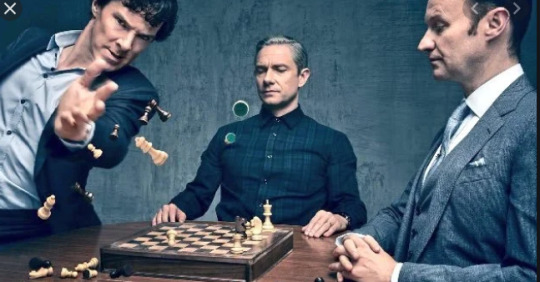
What I find interesting in all these references, is that they all seem to deal with questions regarding ‘dealing with death’ that, in the context of EMP for example, can be seen as Sherlock ‘running simulations’ (or asking philosophical questions) on how to deal with his current situations:
- ‘Do you have permission to kill people before their pre-determined time has come’? (Can people time die before their pre-determined time? Can people escape pre-determined death?)
- Can you interrupt death with love? Was Mary supposed to kill John, fell in love with him and thus his death was postponed? Is John still in danger?
- What can one do to postpone death - perhaps challenging it to a game, hoping for survival as you distract it?
Tagging other meta readers/writers who I think might enjoy this ; let me know if you don’t - I won’t tag you again): @sarahthecoat, @devoursjohnlock @inevitably-johnlocked @possiblyimbiassed @waitedforgarridebs @tjlcisthenewsexy @loudest-subtext-in-tv @therealsaintscully
15 notes
·
View notes
Text
re: getting told i have borderline nazi-ideology
I very recently had an interesting experience that I wanted to share.
I use Discord, a communication program that’s main purpose is an instant messaging feature, you can create a server, which can have multiple “rooms” in it for different topics of conversation. It also has various other features, like voice chatting, video-calling, screen-sharing, etc.
There are lots of uses for it but mainly I use it just to hang out with people. Recently, I started branching out and joining different ‘fandom’ discord servers. I first joined an Arrowverse server, then just a server for people who ship a certain couple on one of the tv shows.
But then I binged all of Agents of Shield and I wanted to find somewhere to talk about it, make some friends. So I joined a server and it started off pretty great. Everyone was very kind. We all love Marvel and Agents of Shield.
Here’s where it turns into an experience (SPOILERS FOR AGENTS OF SHIELD) -
In Agents of Shield and the Marvel Universe in general, there is an organization called Hydra, which was founded by Nazis. Agents of Shield deals with Hydra a lot and one of the main cast members turns out to be a member of Hydra hidden within Shield. The actor Brett Dalton seems like an absolute sweetheart, I’ve actually seen him in person at Dragon-Con a few times and he’s one of those actors that refuses to sit behind his table, he stands in front of it to talk to his fans, give hugs, handshakes, etc.
People were talking about how apparently because of him being a Hydra member in the show and saying things like ‘Hail Hydra’ with fans or maybe even randomly (I’m not sure the context of that - if someone asked him to say it with them or whatever), that people cancelled him and that’s why he only does Hallmark movies now. Which is something I find ridiculous for a few reasons.
Brett Dalton is an actor. He is given a role and he plays it. If that is a good guy or bad guy, it doesn’t matter, he reads the lines and acts the part. The fact that people ask him to repeat lines or certain lines get more famous than others is not his fault.
This brought into question why certain people would even have ‘Hail Hydra’ as a favorite line. Which was incredibly stupid of a question in my opinion.
Hydra is an iconic enemy organization within the Marvel Universe
‘Hail Hydra’ is a quick and easy line to say vs longer quotes
It comes from many iconic scenes in the franchise itself - both within comics & the cinematic universe
Then they questioned why anyone would be a fan of Hydra at all when it’s a Nazi run organization - a fictional, Nazi run organization. I pointed that out and they scoffed at that and said it doesn’t matter. So instead I tried the following reasons -
Some people just love to root for the bad guy - no matter how bad
Favorite actors/actresses play the villains
It’s ‘edgey’ to root for the bad guys
In the end they didn’t buy any of that as good enough reasoning and said that deep down every person who was a fan of Hydra must secretly be a Nazi or Nazi sympathizer and that even if Brett Dalton was a nice guy, he shouldn’t go around saying ‘Hail Hydra’ because some Jewish people have stated it makes them uncomfortable.
Listen, if something makes you uncomfortable, you have the right to say that it does and if it is a good enough reason then maybe that person will change what they are doing, hell, maybe everyone else will agree with you. But I find this entire thing incredibly stupid. If you watch anything from Marvel and expect not to run into something referencing Hydra then you are either naive or incredibly foolish. If Hydra triggers you, if Nazism triggers you, just stay away from Marvel.
“But we should make Marvel available for everyone!”
No, we can’t make everything available for everyone. That is literally impossible. Should some Marvel content have less Nazi references in it for those triggered by it? Sure, I’m sure there is something out there for them.
But this isn’t even the end of this experience I had on this server. I thought we ended this conversation on good terms. But I’ll never know if they were secretly reporting me to the server owner or not. The next bit is when I was given a ‘warning’ not to open my mouth again on my beliefs or I would be kicked from the server.
It started when I saw people just saying things like “America is such shit” and “Yeah, America is such garbage” - even the Americans were saying this. Now I’m a proud American but I understand that the media is very influential, so I tried to be diplomatic in my approach. I entered by saying something like - “America definitely has its problems, that’s for sure, but so does every country - still, look how far we’ve come!”
Responses were not kind to that. They were insistent on just pointing out all the flaws in America. From apparently rampant racism, a fascist regime, terrible public education.
I once again tried to approach diplomatically. I simply said that there is racism everywhere, I don’t think I touched the fascist regime comment, and I agreed on the terrible public education comment. Which spiraled into a talk about our public education system. We all pretty much agreed that our public education system is shit… which I still don’t understand how someone can want more government when the government fucks everything they already run up.
I’m not sure how it went from that to talking about being able to choose who to serve at your business. It’s hard to remember exactly. I just remember the whole Christian Baker thing being brought up but it turns out we were talking about two separate cases.
They were talking about a case where a baker was contacted by a lesbian couple and that baker released their information to a hate website, later they sued the baker and won. Which - yeah, that baker deserved to be milked for every last dime.
But I was talking about a baker that was contacted by a gay couple to make a ‘gay cake’ - this baker said no because it was against his religion, and even told them that he doesn’t make Halloween or Anti-American cakes but he’d happily make them other desserts. But they still sued him and originally the gay couple won but it was taken to the Supreme Court and the baker won the suit. I think it’s a good thing the baker won that case.
No one should be able to tell you who you should or should not serve. If a gay baker is contacted by a homophobic person and is asked to make an anti-LGBTQ+ cake, they should have every right to say “no, I will not.” in the same way a Christian baker should have every right not to make a ‘gay cake’ or a cake covered in penises or an anti-Christ cake.
Do I think it’s dumb not to make a cake for someone just because it’s gay? Yes. Take the business. In the same way I think if a gay person turns down someone just for being straight it’s dumb. But that is their right.
But apparently because this is how I believe, I have borderline Nazi ideology and was told that if I didn’t keep my mouth shut when they spout off about politics, I would be kicked from the server. The message I received was laughable at best. All about making a ‘safe-space’ for members of the fandom from all ages, genders and orientations.
How impressionable young people are around (a few sentences ago it was children - which, there are no children in this server, teenagers, they are teenagers) and that it may influence their minds and opinions in the future - as if their spouting off about how much they hate America and all of their political opinions won’t? The hypocrites.
Then came the point in the message where I was basically called a Nazi. Which… really? I’m autistic, non-binary, lesbian, with several disabilities. The Nazis would have put me in the front of the line to be executed. The gall these people have to think that I could ever agree with Nazis or Nazism. I’ve been to the Holocaust Memorial Museum in Washington, DC. I’ve watched unfiltered footage from WWII of the Concentration Camps and what they did to people like me. It’s disturbing to me how ignorant these people are of what Nazism actually is but mostly it’s sad because of how intolerant they are of anything but their own point of view.
The final bit of the message was about how I had treated people flippantly despite how they expressed their discomfort. Again - the gall of these fucking people. Not one person ever fucking said they were uncomfortable when we were talking. I would have stopped talking about politics immediately if one person spoke up. They just kept talking, kept responding to my messages, but instead they went and tattled on me to the server owner.
So, instead of staying in a server where I was told to just sit down and shut up, I messaged the owner back and told them exactly what I just told all of you. I also told them that they are exactly what is wrong with everyone today, why everyone is so divided and why no one talks to each other anymore. That going through life being unable to hear opposing opinions when they don’t do you any harm is a sad way to live. That it did make me sad that they had just assumed the worst in me because I did enjoy my time there, I even spent a solid month editing a photo as a Christmas gift to the server.
I apologized for making anyone uncomfortable but also told them that no one ever said anything. Then told them I won’t apologize for anything else and that I wouldn’t bother sticking around. Why would I? Everyone had been secretly talking about me it seems. No one had the same opinions as me and no one wanted to hear them. What was the point? So I just left the server.
Being autistic makes it so hard to understand social queues in real life, doing so online is pretty much impossible unless you use emojis that have certain connotations linked to them. I generally have to take people at face value of what they are saying. If no one says that they are uncomfortable - I assume they aren’t. If no one tells me that I’m breaking a rule or doing something wrong, why would I assume differently? Mostly though it hurt me that they all just sat there and decided that I was pretty much a Nazi when I’d been nothing but nice to them. I thought we were becoming friends, some of us anyway.
It just proves that once more, the crowd of ‘tolerance’ is the least tolerable. Now I have no Agents of Shield server and I miss my almost friends.
#agents of shield#discord#discord server#marvel#hydra#brett dalton#politics#hypocrisy#america#grant ward#tv shows#wwii#nazis#nazism#actors#arrowverse#ignorance
5 notes
·
View notes
Note
Is there the full list of brandersons favourite games reposted somewhere?
i dont think so? or not that ive seen. u can literally just sign up for the newsletter on his website but screw it ill just post them for u. it sure was a TRIP scrolling past these to get to the interlude though. undertale is on this list.....im shakign at the thought that adolin was based off ff10 tidus but i cant get it out of my head now
#10: Katamari Damaci
I love things that make me look at the world in a new way. Katamari did this in spades. It is an imaginative, bizarre vision with unique gameplay. It is like nothing else in the world and I love it for all its strangeness and occasional lack of gameplay polish.
I was transfixed the first time I played it, and have looked forward to it being remade and rereleased on multiple different consoles. I love the cute—and somehow creepy at the same time—storyline. It feels like a fever dream more than a game sometimes, and is probably the closest I’ll ever get to understanding what it’s like to do drugs.
#9: Undertale
This is an oddball on this list because I think it’s the only game that is not a franchise from a major studio—but is instead an indie game, which I believe was originally funded on Kickstarter.I loved how this felt like a novel as much as a game. It was one person’s vision; a single story told really well, with a huge amount of personality. The humor was just my kind of wonderful/terrible, and I was instantly enamored with the characters.That probably would have been enough, but it is a nice deconstruction of video games as a medium—and has not one, but multiple innovative gameplay mechanics. Together, the package left me enamored. This is a work of genius that I feel everyone should at least try, even if it ends up not being for them.
#8: Fallout: New Vegas
I have played all of the core Fallout games, and I was one of the (it seems few) who was really excited when it moved from turn-based tactics to first-person shooter. While Fallout 3 was good, it didn’t have the charm of the first two.New Vegas delivered on everything I was hoping to see. The charm was back, the writing sharp, the quests imaginative. The gameplay was engaging and branched in a variety of directions, the gunplay was solid, and the atmosphere immersive. I of course love the first two games in the series—but New Vegas combines everything I like in gaming into one package. (As a note, I own the Outer Worlds, and am looking forward to digging into it. Consider this item on the list a recommendation of other Obsidian games—like Knights of the Old Republic Two—regardless of genre, as I’ve found them universally to be superior to their contemporaries.)
#7 Super Mario World
When I was eleven, I flew (alone, which was very exciting to me) from Nebraska to visit my uncle Devon in Salt Lake City. Before I left, my father gave me $200 and told me to pay for my own meals while on the trip—but of course, my uncle didn’t allow this. At the end of the trip, I tried to give him the money, which he wouldn’t take.I mentioned my dad would take the money back when I got home, but that was okay. Well, my uncle would have none of that, and drove me to the local mall and made me spend it on a Nintendo Entertainment System. (This uncle, you might guess, is an awesome human being.)Since that day of first plugging it in and experiencing Mario for the first time, I was hooked. This is the only platformer on the list, as I don’t love those. But one makes an exception for Mario. There’s just so much polish, so much elegance to the control schemes, that even a guy who prefers an FPS or an RPG like me has to admit these are great games. I picked World as my favorite as it’s the one I’ve gone back to and played the most.
#7: The Curse of Monkey Island (Monkey Island 3)
I kind of miss the golden age of adventure gaming, and I don’t know that anyone ever got it as right as they did with this game. It is the pinnacle of the genre, in my opinion—no offense to Grim Fandango fans.This game came out right before gaming’s awkward teenage phase where everything moved to 3-d polygons. For a while after, games looked pretty bad, though they could do more because of the swap. But if you want to go see what life was like before that change, play Monkey Island 3. Composed of beautiful art pieces that look like cells from Disney movies, with streamlined controls (the genre had come a long way from “Get yon torch”) and fantastic voice acting, this game still plays really well.This is one of the few games I’ve been able to get my non-gamer wife to play through with me, and it worked really well as a co-op game with the two of us trying to talk through problems. It’s a lovingly crafted time capsule of a previous era of gaming, and if you missed it, it’s really worth trying all these years later. (The first and second games hold up surprisingly well too, as a note, particularly with the redone art that came out a decade or so ago.)Also, again, this one has my kind of humor.
#6: Breath of the Wild
I never thought a Zelda game would unseat A Link to the Past as my favorite Zelda, but Breath of the Wild managed it. It combined the magic of classic gameplay with modern design aesthetic, and I loved this game.There’s not a lot to say about it that others haven’t said before, but I particularly liked how it took the elements of the previous games in the series (giving you specific tools to beat specific challenges) and let you have them all at once. I like how the dungeons became little mini puzzles to beat, instead of (sometimes seemingly endless) slogs to get through. I liked the exploration, the fluidity of the controls, and the use of a non-linear narrative in flashbacks. It’s worth buying a Switch just to play this one and Mario—but in case you want, you can also play Dark Souls on Switch... (That’s foreshadowing.)
#5: Halo 2
Telling stories about Halo Two on stream is what made me think of writing this list.I’m sometimes surprised that this game isn’t talked about as much as I think it should be. Granted, the franchise is very popular—but people tend to love either Reach or games 1 or 3 more than two. Two, however, is the only one I ever wanted to replay—and I’ve done so three or four times at this point. (It’s also the only one I ever beat on Legendary.)It’s made me think on why I love this one, while so many others seem to just consider it one of many in a strong—but in many ways unexceptional—series of games. I think part of this is because I focus primarily on the single-player aspects of a game (which is why there aren’t any MMOs on this list.) Others prefer Halo games with more balanced/polished multiplayer. But I like to game by myself, and don’t really look for a multiplayer experience. (Though this is changing as I game with my sons more and more.)I really like good writing—which I suppose you’d expect. But in games, I specifically prefer writing that enhances the style of game I’m playing. Just dumping a bunch of story on me isn’t enough; it has to be suited to the gameplay and the feel of the game. In that context, I’ve rarely encountered writing as good as Halo 2. From the opening—with the intercutting and juxtaposition of the two narratives—to the quotes barked out by the marines, the writing in this game is great. It stands out starkly against other Halo games, to the point that I wonder what the difference is.Yes, Halo Two is a bombastic hero fantasy about a super soldier stomping aliens. But it has subtle, yet powerful worldbuilding sprinkled all through it—and the music...it does things with the story that I envy. It’s kind of cheating that games and films get to have powerful scores to help with mood.The guns in Two feel so much better than Halo One, and the vehicles drive far better. The only complaint I have is that it’s only half a story—as in, Halo 2 and 3 seem like they were one game broken in two pieces. And while 3 is good (and Reach does something different, which I approve of in general) neither did it for me the way Two did, and continues to do.
#3: Final Fantasy X
You probably knew Final Fantasy was coming. People often ask if the way these games handle magic was an influence upon me. All I can say is that I’ve played them since the first one, and so they’re bound to have had an influence.On one hand, these games are really strange. I mean, I don’t think we gamers stop quite often enough to note how downright bizarre this series gets. Final Fantasy doesn’t always make the most sense—but the games are always ambitious.Ten is my favorite for a couple of reasons. I felt like the worldbuilding was among the strongest, and I really connected with the characters. That’s strange, because this is one of the FF games without an angst-filled teen as the protagonist. Instead, it has a kind of stable happy-go-lucky jock as the protagonist.But that’s what I needed, right then. A game that didn’t give me the same old protagonist, but instead gave me someone new and showed me I could bond to them just as well. Ten was the first with full voice acting, and that jump added a lot for me. It has my favorite music of the series, and all together is what I consider the perfect final fantasy game. (Though admittedly, I find it more and more difficult to get into turn-based battle mechanics as I grow older.)
#2: Bloodborne
Those who follow my streams, or who read other interviews I’ve done, probably expected this series to be at or near the top. The question wasn’t whether Souls would be here, but which one to pick as my favorite.I went with Bloodborne, though it could have been any of them. (Even Dark Souls 2—which I really like, despite its reputation in the fandom.) I’ve been following FromSoftware’s games since the King’s Field games, and Demon’s Souls was a huge triumph—with the director Hidetaka Miyazaki deserving much of the praise for its design, and Dark Souls (which is really just a more polished version of Demon’s Souls).As I am a fan of cosmic horror, Bloodborne is probably my favorite overall. It really hit the mix of cosmic and gothic horror perfectly. It forced me to change up my gameplay from the other Souls games, and I loved the beautiful visuals.I am a fan of hard games—but I like hard games that are what I consider “fair.” (For example, I don’t love those impossible fan-made Mario levels, or many of the super-crazy “bullet hell”-style games.) Dark Souls is a different kind of hard. Difficult like a stern instructor, expecting you to learn—but giving you the tools to do so. It presents a challenge, rather than being hard just to be hard.If I have a problem with Final Fantasy, it’s that the games sometimes feel like the gameplay is an afterthought to telling the story. But in the Souls games, story and gameplay are intermixed in a way I’d never seen done before. You have to construct the story like an archeologist, using dialogue and lore from descriptions of in-game objects. I find this fascinating; the series tells stories in a way a book never could. I’m always glad when a game series can show off the specific strengths of the medium.In fact, this series would be #1 except for the little fact that I have way too much time on Steam logged playing...
#1: Civilization VI
This series had to take #1 by sheer weight of gameplay time. I discovered the first on a friend’s computer in the dorms my freshman year—and I can still remember the feeling of the birds chirping outside, realizing I’d been playing all night and really should get back to my own dorm room.That still happens, and has happened, with every game in the series. I have a lot of thoughts on this series, many of them granular and too specific for this list. (Like, it’s obvious AI technology isn’t up to the task of playing a game this complex—so could we instead get a roguelike set of modifiers, game modes, etc. to liven up the games, rather than just having a difficulty slider that changes a few simple aspects of the game?)I’ll try not to rant, because I really do love this game series. A lot of people consider IV to be the pinnacle of the series, but after V unstacked units—and VI unstacked cities—there was no way I could ever go back. If for some reason, you’ve never played this grand patriarch of the 4X game genre, it’s about starting with a single stone-age settler who can found a city—then playing through eras of a civilization, growing your empire, to try to eventually get offworld with a space program. (Or, if you prefer, conquering the world.)It’s a load of fun in the way I like to have fun, and I feel like the series has only gotten better over the years. My hat is off to the developers, who keep reinventing the series, rather than making the exact same game over and over.Now, about that request for difficulty modes...
there are runner ups but for the sake of anyone whos on mobile and cant get past a read more (first of all omg im SO sorry) ill refrain. anyway he thought WHAT loz game was the best before botw?
#mix between HARDCORE judgement and like. yea. yea ff10 was pretty good wasnt it#but i dont think its anywhere near the best of them#long post#im read mores dont work imm so fucking sorry this is so long#MOST of these games are good its just so wild its so wild its SO wild#asks#Anonymous
20 notes
·
View notes
Text
Expert Interview with Professor Piero Garofalo

The following contains edited excerpts from an hour-long interview conducted with Professor Piero Garofalo from the UNH Italian Studies department. Professor Garofalo is a professor of Italian Studies and the coordinator of the Italian Studies program. He has recently taught linguistics and film studies for the Italian department. When he came to UNH there was no Italian program so he was essentially hired to introduce Italian to UNH. He developed many of the Italian courses that UNH offers, started the department’s study abroad program, and worked with others to get the Italian minor and major developed. His research experience, which can be explored in more detail here, includes explorations of culture and cultural production within certain periods, fascism’s relation to this, and internal exile in fascism, to name a few areas of interest. For my interview, we discussed fascism, populism, and media.
Disclaimer: The content is edited for length and clarity, but the meanings behind the answers are not altered. The full transcription can be accessed here for more information. The format shares highlights of quotes or responses on specific topics which demonstrate my understandings as well as Professor Garofalo’s expertise.
---
Interviewer: Zoe Dawson (ZD), senior Communication student at UNH
Interviewee: Piero Garofalo (PG), professor and program coordinator for Italian Studies Department at UNH
---
On the topic of fascism in relation to our course (p. 2):
ZD: So I’ve looked into your research on the COLA website and I saw that you had some research focus on fascism (PG: Mhm) so first I thought I would share a few of the things that I’ve learned in this class so maybe we can have a conversation about that or hear about your research... So, in a reading by Federico Finchelstein from my class, we read that “Fascism was founded in Italy in 1919 but the politics it represented appeared simultaneously across the world.” (PG: *nods head*) And then, also he talked about Mussolini’s version of [fascism] being that “the creature was bigger than the creator,” which I thought was interesting. And so those two points, I thought, were significant in relation to Italy.
PG: Yeah. So, I think Federico Fincehlsltein is, I think he’s Argentinean (ZD: *nods head*). I’ve read several of his studies and he does a really good job of taking concepts like fascism, in particular, fascism and populism, and globalizing them beyond the usual suspects. So instead of just looking at fascist Italy and Nazi Germany, he’ll look at Latin America and different movements to kind of give a broader perspective.
I definitely agree about what he said about fascism in Italy in the sense of, the term itself obviously comes from Italian. Preceding Mussolini there was a movement in Sicily called The Fasci Siciliani. Fascia really is just a bundle. It’s a bundle of rods or sticks. So, that movement was really a workers’ union, almost like a unionized attempt to form a union against these large landowners and that movement was suppressed. The government intervened and they were striking and twenty-two of them, twenty-two of the strikers, were killed. And that’s a very different type of movement than what Mussolini was doing (ZD: Mhm), even though the origin of the term is the same. Yeah, so we have this movement in Italy that begins in 1919 and takes on the name of fascism, and that term kind of ends up being, you know, good PR (ZD: *laughs*) and has a lot of success internationally and becomes sort of the default term, kind of becomes overused today right? We talk about ‘fascist, anti-fascist’ without contextualizing the terms.
And yeah, I think it also, the second part that you mentioned, I think it definitely did grow much beyond what he was trying to do or thought of. And so, when we talk about fascism, even within that historical context, we need to be careful about what we mean because Italian fascism is different from Spanish fascism from the 1930s, from German Nazism, and so on and so forth, but even though they share many commonalities and a similar sort of source within each of those societies.
On the connections between fascism and populism (pp. 6-9):
ZD: … I have a few questions related to what I’m about to say, but also in our class we’ve learned about the idea of modern populism as being a post-fascist idea, and also being like a reformation of fascism in post-war contexts so what are your thoughts in relation to Italy since fascism was so prominent?
PG: Yeah I understand the definition, but I don’t know that I necessarily agree with that definition because there are many movements that I would describe as populist which I would not describe as fascist (ZD: *nods head*). If populism is also sort of this mass reaction to the elite, we hear that rhetoric a lot. We talk about Trumpism as a form of populism, you hear that rhetoric against the liberal elites and that sort of thing. You know, there was the Occupy Wall Street movement, which was the 99% against the 1%. You could even think about Black Lives Matter movement, as a grassroots movement or people reacting against the elite, the people in power, the people who’ve created a system that doesn’t allow them to flourish.
In Italy, we have two movements, in your blog you talk about them both. We have the League, the Northern Leagues which now have expanded beyond just being the Northern Leagues, that are a populist movement that I would align to some degree more closely with that idea of fascism, of neofascism. But then we have the 5 Star Movement which describes itself as a movement whose major tenets are the environment, sustainability, access to democracy- everyone’s supposed to have a vote and have access to a vote and participate in the vote, you’re not supposed to be excluded, which many of its programs we would associate more with the political left…
So, a direct line between neofascism, or fascism, and populism I don’t necessarily see. Lots of different movements which have certain characteristics that might fall into these different categories. And it’s become such a broad term that it’s begun to also lose its significance. The word itself as you know, the Latin word populus or in Italian popoli, it’s the people and having that word have a negative meaning. I don’t think it co-opted that way either, I like to think that when people are reacting to an injustice that they see that involves fundamental changes in society, that can still be a positive and not fall under the same rubric as Hilter and Mussolini.
ZD: … That made sense. In our class, I think in the same Finchelstein reading, he talks about how the word ‘fascist’ and the word ‘populist’, they’re both sometimes used interchangeably and also used to describe something as evil or bad even when that really isn’t the case with historical definitions, so what you said made sense with that.
Then also relating to fascism, what do you think the remnants of fascism look like in Italy? I know you mentioned the League, which is far-right.
PG: There is a party that’s more in tune with fascism than the League even. Its new name is Brothers of Italy, FDI- Fratelli d'Italia, and that’s like Le Pen’s party in France. So that’s sort of a far-right party that really does see itself as the heir of fascism. Its earlier iteration, Mussolini’s granddaughter, Alessandra Mussolini, was a part of it. After World War II, the fascist party was nonexistent, but this party formed called MSI- Movimento Sociali Italiano, Italian Socialist Movement which was really a fascist party, although the die-hards stuck with that it was always a very tiny party.
The other big difference, of course, between Italy and the United States is that Italy has many political parties and it’s easier than here to find a party that conforms more closely with your ideas. Here you kind of have a choice between two parties, and you might agree with everything your party says, but chances are there are divisions. Some things you agree with, some things less. There the parties are much more splintered, there’s an issue that they don’t agree on, they kind of split and go on in different directions.
So this party then became Alleanza Nazionale, or AN- National Alliance, and in that iteration in the 1990s it kind of rehabilitated its image as being professional, not talking about fascism the way it was spoken about in the past but trying just to appear like a legitimate party. They didn’t use a lot of rhetoric, it wasn’t populist in that sense, it wasn’t trying to appeal to people’s emotions and whatnot. It was trying to just rehabilitate fascism in a way that made it seem innocuous and the latest iteration of that party because different moments or scandals or events have led to the elimination of Italian parties… So the latest iteration is this one, Fratelli d'Italia, Brothers of Italy, which is the real right-wing party. The League, the Northern Leagues now there are various Leagues so we just call it the Leagues, shares many commonalities with right-wing parties. In particular its very strong stance against immigration and its xenophobia toward immigrants. In other aspects, it’s anti-European but it’s anti-Italian as well. These parties go back to origins of the modern Italian state where they never see that they’re Italian, that they’re from Venice or Milan. They see their local identity which is what survived for thousands of years. They never managed to bring the puzzle of Italy together to form a unified country.
So, they’re very much rooted in the local; in the local traditions, in the local ideas, the local language, and that’s why they’re anti-immigration. They’re anti-anyone who isn’t them. They’re anti-Southern Italian. They’re anti-everything it seems. They wanna secede, they want total autonomy. That’s why they’re anti-European because European identity kind of erases or limits your national identity… And that’s what we see in Italy, in particular, is that populism frequently takes on that League form of local identity. You have a League in Sicily, it’s the same thing, ‘We wanna be independent.’ So it takes on these kinds of xenophobic and philo-fascist attitudes in many activities. It also sees the central government as the enemy because it conquered Sicily literally. So in Italy populism, with the exception of the 5 Star which is this very different kind of movement, the populist movements tend to be very focused on the local identity and reasserting a local identity that the Italian nation has tried to wash over, eliminate, white-wash for the past 150 years since unification.
ZD: Yeah, I think that’s interesting what you were talking about with the regional specificity kind of. I watched a documentary and one of the politicians was harping on ‘Italians First’ but based on what you said it sounds more like specific to their region, their people first. (PG: Yeah.)
On how populism has affected the political climate in Italy (pp. 9-10):
ZD: … how would you say populism has affected Italy’s overall political climate?
PG: Well it’s definitely created more chaos. The Italian political system was intentionally designed to be weak. After fascism, the Constitution is intentionally designed to not let political parties accomplish very much unless there’s a lot of support for what they’re doing. The moment that there’s opposition to what they’re doing they get kicked out of power. So it always seems like Italian governments don’t last very long, but that’s built into this system…
The populist parties have made that more difficult because there’s less room to compromise. They have very strong stances on big issues that used to be, despite differences, pretty much agreed on… So you’ve lost room to really coalesce, to form a coalition with other parties with enough common ground where you can really accomplish stuff. That’s always been a challenge but not really a big one because we see historically these same parties really ended up forming the next government only with a slight change and then they got the legislation that they wanted to do until they hit the next crisis. There was a lot of predictability. You weren’t worried that the country was gonna go in a completely different political or economic or social direction. Now it’s a lot harder to predict, there’s a lot less certainty and it’s not clear who the opposition is either. The center-left parties are also reforming themselves and fractured and also have less coherent identities so it makes things much more messy and tricky now.
ZD: Yeah that makes sense and I’ve definitely seen that. And it seems really relevant to right now also. I researched a little about Giuseppe Conte’s coalition and that really led to him having to resign.
PG: Yeah, and it was one of the center-left parties that withdrew. They had like 1% of the vote, but that 1% was all they needed, and all of the sudden he didn’t have a majority and he was out. And it was a gamble because they could’ve gone to elections or Salvini could’ve come into power or something and now we have this technocratic government and we’ll see if it lasts until the elections next year.
On the populist presence in the media (pp. 12-13):
ZD: … one of the people I focused a lot on was Matteo Salvini and his use of Facebook and Facebook live to kind of “expose” people like I’ve seen him shouting at immigrant families and things like that. And it’s very blunt and in your face (PG: *nods head* Right) which is effective for his followers which I think is interesting. So if you follow any Italian media and government, how would you say the populist presence is?
PG: I think it’s expressed the most through social media. In Italy, the media for many years was dominated by the RAI, sort of the BBC of Italy. So you had these sort of government-owned and so anything they talked about they’d have to present all the different parties’ sides, everyone had to have equal time on television running for office, this sort of thing. That changed in the 1980s when Silvio Berlusconi came into power, so it’s part of the Ronald Reagan, Margaret Thatcher movement, this neoconservatism of the 1980s… In the last decade especially, social media has become the center ground for promoting your ideas, promoting your campaigns, and being media savvy is extremely important for, especially populist politicians, but modern politicians in general.
One of the things about Donald Trump was this constant use of Twitter, right? Always keeping himself in the news. Obama was considered incredibly media savvy, but he didn’t do things the way that Donald Trump does and Joe Biden is not media savvy in that same way at all. But as you pointed out with Salvini, they’ll do lots of events which they’ll stream live through Facebook. They keep issues in your face. If it’s print media or the 6 o’clock news, it dies after a day or two or three, but they don’t let it die. They keep it in your face, in your feed constantly. So they’re very active on Twitter and other platforms, though certainly, Facebook is the most dominant one. They use it to connect to people and to keep them enraged in a sense, you know? To keep you emotionally invested so that you’re out there voting, promoting that point of view, and you’re keeping them on everyone’s mind. PR is half the battle, so if it’s always out there they must be important, they must have something to say.
ZD: Yeah I was gonna ask how the forms of media play into social and cultural grievances, but that really seems like the answer (PG: Yeah). That it’s so in your face that you can’t really avoid it. I was gonna ask also what populism’s role is in inflating that, but that also seems to be kind of the answer.
PG: Yeah I think that it doesn’t matter what the issue is. Whether it’s a boat capsizing in the Mediterranean or a boat being stopped, or some sort of government scandal- I can’t think of a good one that’s happened recently, but anything is an excuse for outrage that allows them to step forward and say, ‘Look at what they’re doing, we need to stop this’ even if they’re doing the same thing…
---
Thank you again to Professor Piero Garofalo for taking the time to be interviewed and giving very insightful answers!
---
Finchelstein, F. (2017). From Fascism to Populism in History. Oakland, California: University of California Press. http://www.jstor.org/stable/j.ctvpb3vkk
1 note
·
View note
Text
5 Things I Learned About Jane Eyre

A few years ago I was interviewed by a UK based educational company in preparation for their release of content about the Brontës aimed for teachers and students. Sadly the company, Train of Thought Productions, seems to be no more, but at the time they sent me a complimentary copy of the DVD titled “Brontës in Context”. Unfortunately I believe it is hard to find now, but I found it a very interesting examination of the Brontës’ lives and work.
The Jane Eyre section of the DVD was especially illuminating. I’ve never studied Jane Eyre in school, and although I've read critical texts about the story, there are schools of thoughts that I haven’t really explored. Jane Eyre is such an intertextually rich story, that I should have anticipated that this DVD would be eye-opening in unexpected ways. So this post is about the things I learned from the "Brontës in Context" DVD.
1st Person Narration
Okay, I do know that Jane Eyre is written in the first person. And I know that because the novel has a first person POV, the reader is drawn more into Jane's story, her spirit and her fiery nature. But one comment from a professor on the DVD really struck me - the idea that Jane addresses the reader personally (by saying "reader") more and more as the story progresses. "Reader, I married him." being the famous example. I was curious though to see if that was really true, so I went to the Gutenberg online copy and did a search - in the scroll bar, there are little yellow ticks that show where the word comes up in the text, so I took a screenshot of that bar to illustrate (I made the scroll bar horizontal).

From left to right: The beginning of Jane Eyre to the end
Again the yellow marks are every time Jane says "reader" (which is not absolutely accurate since there are like three times it's in the novel, and it's not addressing the reader of the book) But it's true that Jane does directly reach out to the reader more as the novel progresses. The professor on the DVD explains it as Jane wanting to take control of her story, and one way she does this is by correcting the reader's thoughts - by giving them the truth directly. I thought that was a fascinating and accurate explanation of the purpose of Jane addressing the reader.
Bluebeard
To me, Jane Eyre is most succinctly compared to two fairy tales - Cinderella and Beauty and the Beast. I am aware of a Bluebeard connection, but I feel like the aforementioned tales encompasses the story more. But after watching this DVD I am leaning more towards seeing Jane Eyre in a "Bluebeard" light. Especially as Jane Eyre is a Gothic novel, and Bluebeard fits that genre the best of these three tales. There's a "secret at its heart" (quote from the DVD) which is a thoughtful encapsulation of both stories. And there was a comment made by one of the professors that placed the reader of the novel as the curious Bluebeard wife, reading the novel to discover the secret. Such an interesting idea! (And does that mean that Mr. Rochester is my husband??)
St. John and Helen
The role of religion is touched on in the DVD, and there was a thought that the character of St. John Rivers (who is not a bad person, but is kind of unforgivably self-righteous - oh, just me?) hearkens back to Jane's friend Helen Burns. Helen is such a positive character and St. John considerably less so, that I initally felt it's almost a slur on Helen to link the two. But in the context of what the professor on the DVD said it makes sense - they are similar in that they 'quash physical desires'. And in that way I can understand why Jane would be drawn to them - they both encourage Jane to embrace a devotion to God and reason, at a time when her passionate nature is giving her the most pain. Unfortunately for St. John, his function later in the novel means he also has to show Jane that living such a cold, dispassionate life is not for her. And hey, both Helen and St. John meet untimely ends. Which to my mind is Charlotte making a harsh judgement on the idea of living just for God.
Jane and Injustice
Here's something that is hugely appealing to me about this novel. The novel can be pointed to as a feminist work, and Jane is speaking out for women everywhere, but what I love about Jane is that it's not her treatment as a woman that makes her upset. She's really angry at injustice. And the whole misogyny thing is just a part of that. It really took this DVD to drive that home to me. Jane is so passionate about what she feels is not right - the inability of Mrs. Reed to love her, the treatment of the girls at Lowood, the way Mr. Rochester speaks of Bertha, St. John Rivers not wanting to marry Rosamund Oliver. It's a glorious aspect to her character and reminds me of a line from an old sixties adaptation of the novel - Mr. Rochester calls Jane "the small crusader, pitiless with righteousness and rectitude." Rochester was a little harsh with that line, but I do like the 'small crusader' imagery. (In the 1961 adaptation he's more perturbed than happy that Jane's come back to him after he's been blinded and can not be the kind of man he wants to be for her.)
Postcolonialism
The DVD touches on three critical schools of thought in connection to Jane Eyre - Feminism, Marxism and Postcolonialism. And I learned two things in relation to the last one - what Postcolonialism is exactly, and that I really don't like seeing Jane Eyre in that context. In a nutshell, Postcolonialism is looking at the imperialist, British attitude as represented by Mr. Rochester as rich white guy, and Bertha as poor Creole woman. And Bertha's relation to Jane as a dark mirror. There's even a book written with those themes called Wide Sargasso Sea which is a prequel to Jane Eyre. It's from Bertha's viewpoint. I didn't care for the book actually. The thing with me is, I am sympathetic to Mr. Rochester. And I don't really see how you can accept the view that Mr. Rochester is a lying, manipulative scoundrel with no redeeming qualities and still like the novel or Jane. Because Jane - the character to whom the reader is intimately involved and invested in - chooses Mr. Rochester in the end, as the person who makes her the happiest. And if you love Jane because she is an intelligent, moral, capable heroine, as we have gotten to know her and rely on her throughout this story - it's silly to think she is so mistaken as to have made a horrible choice in the end. Also she is telling her story with 10 years distance, and not repenting her decision. She is happy, so what more could anyone ask for?
But back to Postcolonialism and why it does not gel with me; because I also feel like making a story called JANE EYRE, with the first person narration by said JANE EYRE, and then evaluating the story through NOT the main character is kind of ridiculous. Jane Eyre is such a personal journey, that I feel it's a big leap to talk about the novel like Charlotte Brontë was seriously examining slavery/race and British imperialism. If one chooses to see Bertha as completely innocent and horrendously mistreated, at least let it be because Mr. Rochester has misjudged her and acted unsympathetically, before saying it's obviously a master/slave dynamic. And I will just insert this excerpt of a letter that Charlottë Bronte wrote in response to some comments on Bertha:
Miss Kavanagh's view of the Maniac coincides with Leigh Hunt's. I agree with them that the character is shocking, but I know that it is but too natural. There is a phase of insanity which may be called moral madness, in which all that is good or even human seems to disappear from the mind and a fiend-nature replaces it. The sole aim and desire of the being thus possessed is to exasperate, to molest, to destroy, and preternatural ingenuity and energy are often exercised to that dreadful end. The aspect in such cases, assimilates with the disposition; all seems demonized. It is true that profound pity ought to be the only sentiment elicited by the view of such degradation, and equally true is it that I have not sufficiently dwelt on that feeling; I have erred in making horror too predominant. Mrs. Rochester indeed lived a sinful life before she was insane, but sin is itself a species of insanity: the truly good behold and compassionate it as such.
- Charlottë Bronte to W.S. Williams, written 4 January 1848
For me, the interesting points in the letter being Charlotte was (later?) more sympathetic to Bertha's plight, but not condemnatory of Mr. Rochester - she mentions that Bertha has led a sinful life before she was insane and that because of the nature of Bertha's insanity (as Charlotte wrote and understood it), it was probably too easy to 'demonize' her from the character's POV, which shouldn't happen to someone who is truly compassionate. Obviously Mr. Rochester doesn't get points in the philanthropy department which is noted by Jane early on. I understand and completely believe that Bertha's situation is awful and sad in so many ways, but I don't feel that it is important enough to the novel to base interpretations of the story on. Yet can I point out that Mr. Rochester didn't lock up Bertha for funnsies - it would have been so much easier for him if she were not mad because then he could divorce her. (The law at the time being that you could not divorce your wife if she was diagnosed insane.) If he could have let her go to have a normal life and not been responsible if she attacked people, he probably would have been all over that.
To wrap up, I am saddned that this DVD is not widely available any more (at least my google searches have not been fruitful) because it was a very well concieved educational program. This DVD was sent to me in 2015, and I’m revisiting it, by posting this on my blog. I orginally posted this on a former blog. And I believe this post once featured on the Train of Thought Productions website, but sadly that site is no more.
47 notes
·
View notes
Text



So I saw this going on Twitter and Tumblr, and I would like to add my two cents on the matter.
I will premise this by saying that I cannot speak for Horikoshi on why he did what he did; whether he was just being ignorant to people's feelings or if he had a different intent in mind. Nor can I claim to know the degree of offence the term has. For the sake of this post, I will be using it, but if it carries the same weight as the N Word, I do apologize in advance and I may censor it in the future.
All I'm going to say is based on what I believe went into Dr. Ujiko's "real name" (I use quotes because I'm still unsure what his actual name is considering the "Tsubasa" theory), so this will be a slight character analysis.
As someone who knows a good amount of History's atrocities (from reading literature from various time periods as part of my studies), I for one never knew about Unit 731 and the biochemical human experimentation during WW2. After reading up on it (and I did look into it quite a bit), I found that while the victims were called "maruta" by the Japanese soldiers and scientists, the experimentation was also dubbed the same name.
One could argue that this justifies using the term "Maruta" as the name for the scientist that does, in fact, conduct human experimentation. But one thing I know for certain is nothing is 100% justified. Especially considering the character the name is attached to is a "villain."
If Horikoshi named Dr. Ujiko after the victims of the Unit 731 human experimentation, then that is in bad taste and offensive to those who were affected by it. But if he was trying to use the name as the acts themselves, I can see the intent. Especially after I came across two passages in different articles. One on a website, and one from a NY Times article:


I did find these particular parts interesting. The scientists who were in Unit 731 ended up being respectable members of society. That concept applies to our twisted doctor to a T.


So we have a man who is a well respected doctor that conducts human experimentation in secret. Which is reminiscent of the real-life doctors from Unit 731.
If Horikoshi intended for the term "Maruta" to mean the actual experimentation, then this is probably one of the most thought out names so far. He seemed to do his research when both creating and naming Ujiko.
However, if it is to refer to the victims, then again that is bad taste and he should rename it. Though it still could be a name from the same situation, just on the scientist part, rather than the victims.
Though one thing I can say is that,to a certain degree, using this particular name does in fact bring awareness of this certain atrocity in Japanese History, and Horikoshi's knack for naming seems to well researched.
TL:DR: The use of "Maruta" as Ujiko's real name does have some historical merit and Horikoshi seemed to know what he was doing, but it still could be in bad taste if he used the wrong context. We will have to wait to see if he addresses it .
Also side note: I'm betting that "Shiga" is from AFO's last name being "Shigaraki"
31 notes
·
View notes